 How Much Writing Do You Have to Do in Law School?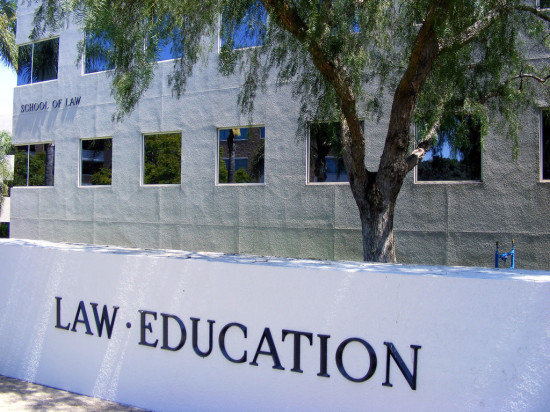 Becoming a lawyer means you have to become good at a very specialized type of writing. In law, it’s not so much a matter of how much you write as how you write it. But as the saying goes: “Practice makes perfect,” and with business deals , agreements and even people’s futures on the line, if you miss an important point or choose the wrong words, the ramifications can be huge. Here’s the main point you need to understand about writing and law school. You probably won’t be writing anything extraordinarily lengthy while at law school, but writing it will take a long time. You might spend hours on a single paragraph, tweaking it to make it just right. For the layman, legal writing might just look like a lot of words strung together, but every one of them is there for a reason and getting them right is crucial. Your law review papers will be the longestMost law students agree that the volume of writing isn’t so much of an issue. Your longest pieces will be law review papers, and the footnotes alone can be extensive and time-consuming. But they warn course work grades are often based on essays or papers, and the marks you get on these will make or break your pursuit of a law degree. In the first year, chances are you’ll have to do a course covering legal research and writing. As you may have guessed, it will involve quite a lot of writing. But thereafter, the volume of written work decreases. The most important thing will be being able to write well and cram a lot of information into a few clear sentences. So if you’re worried about required writing, the volume isn’t all that huge, but if you want to do well, you will probably need to practice not only your writing but your reading. Practice reading?At law school, you need to learn how to write like a lawyer, and there’s no better way of doing that than to learn to read like a lawyer. That means being able to grasp the language that is used – and believe me – although it’s English, it’s not the kind of English you’d usually use when you hang out with your buddies. According to many law professors, reading like a lawyer is the biggest hurdle for most students. You may need hours to read a case that’s only a few pages when you first become a student. The good news is that the more you read, the better you get at understanding all the legal language, and the better equipped you’ll be when the time comes to do your own writing. It’s a learned skill – and you will use it a lotIf reading the terms and conditions for the app you’re planning to download makes your eyes go blurry, and wading through contracts before you sign them gives you a headache, you’re not alone. Legal writing is a learned skill and uses its own special language and terminology. If you have a genuine eagerness to become a lawyer, you will need to master it. You shouldn’t be considering a legal career if you don’t like writing. Legal writing is a bit like “blood and guts” and becoming a doctor. You might not see them all the time as a student, but when you do, things aren’t going to work out for you if you’re squeamish. Lawyers deal with words. There’s no such thing as a lawyer who doesn’t write. Do you want to be a lawyer but not sure you’ll cope?For a start, be absolutely sure you know what being a lawyer is like. A lot of students don’t. It’s nothing like what you see on TV. The reality of working in the legal field isn’t featured in courtroom dramas. The truth (and nothing but the truth) is that many lawyers will seldom see the inside of a courtroom. If you do end up in court, most of it will be very un-dramatic and quite boring. Before you apply for law school read up on what being a lawyer would entail and how your career would progress. If law still sounds like just the thing for you, you can get a head start on your fellow students by reading “Thinking Like a Lawyer: A New Introduction to Legal Reasoning” by Frederick Schauer. Hint: It will likely cover a lot of the work you’ll be given in your first year. If you can grasp that legal reasoning, you’ll likely be able to manage the writing as well. Writing starts with thinking, and once you think like a lawyer, you should have the skills to write like one and get through law school. (Photo courtesy of Mathieu Marquer ) Learning to write like a lawyer is like learning a different language. It really is that different from your every day English. It sucks the first year because it takes so much time, but it gets faster as you become more familiar on how to write like a lawyer. It’s definitely one of the more difficult aspects that weeds out a lot of first year students. Well, this makes law school sound a lot more unfun than I already thought it was going to be. I hated languages when I was in high school, so the thought of law writing being like learning a new language makes me think that this may not be what I want to do. I want to be a lawyer, but I don’t want to hate being lawyer. I think I’m going to have to consider long and hard on this decision. hey its been 5 years did you end up going to law school?? Lawyers have to write a lot and research even more then write down what they research. This is a very time consuming process and the amount of writing that you have to do is sometimes overwhelming. This is definitely nothing like you see on the TV there is a lot more writing involved than you might think. It’s not even writing what you research; it’s synthesizing the information from numerous sources and coming up with a cogent argument that pulls it all together. I’m 14 and really want to be a lawyer but I feel that reading fast and staying active while reading has always been a huge challenge for me. I’m also quite smart…mostly in the science category but I don’t really like any career in that aspect…my only choice is law…and I’m kinda scary I’ll suck in law Honey, there are literally *thousands* of other occupations available to you. Law and medecine are only two of them. The movie “Clueless” comes to mind. lol The main character’s dad is a lawyer and he has to write so much. His daughter and step son help him one time and they spend hours highlighting dates in stacks and stacks of paper. Ugh. I do not want to be a lawyer. I don’t think you should really decide whether or not to be a lawyer based on the movie Clueless. Just saying… Writing in law school is something completely new. I found that out when I start the new term. All the vocabulary is different and also the way of writing. Although difficult, it is quite possible with a lot of persistence and also practice. It might be time-consuming, but you get it after a while. Most students are quite shocked when they learn that the job of a lawyer is 90% writing. That’s not only school, but he real world too. I blame it on TV shows that make it look so much different than it really is. If you don’t like to write, you don’t want to be a lawyer. It’s as simple as that. Is there enough writing in law school that if I don’t like it, I should think of doing some other career? The thought of being a lawyer is appealing to me and I was thinking of going to law school after graduating from college, but I don’t like to write much. What’s your opinion? This is a bit deceptive. I don’t dispute there may be a lot of writing if you want to go to law school, but there is going to be a lot of writing a matter what major you decide to pursue in graduate school. Just like there is a lot of writing when you’re in college, it doesn’t get any better when you decide to go to graduate school. That’s just the nature of academics. So, yes, there is a lot of writing you decide you want to go to law school, but there will be a lot of writing to matter what postgraduate education you pursue. Popular Posts- The Top 10 Most Difficult-to-Spot Writing Mistakes
- 4 Simple Tips for Great Writing
- Avoiding Wordiness: 330 Examples & What to Use Instead
- The Oxford Comma: The Splice of Life
- Who vs. Whom
- Affect vs. Effect
- How to Take Notes: The 10-Step Guide to Note-Taking (Infographic)
- CMOS vs. AP – Recent Changes & Comparison (Updated 1. Nov. 2021)
- The Daily Word Counts of 19 Famous Writers
- The Ideal Length of Everything You Write Online ( Infographic)
Recent Comments- Justin Robinson on Words Everyone Seems to Hate
- admin on Privacy Policy
- kougra on Word Counter Reading Level Feature
- Sigma on Word Counter Reading Level Feature
- Mel S. on How Many Pages Is 2000 Words?
 Session expired Please log in again. The login page will open in a new tab. After logging in you can close it and return to this page. “An Arbitrary Fraction”: How the Family and Medical Leave Act Fails Rural WorkersBending Gender: Disability Justice, Abolitionist Queer Theory, and ADA Claims for Gender DysphoriaVoluntary prosecution and the case of animal rescue. - Justin Marceau
- Wayne Hsiung
- Steffen Seitz
Extrajudicial Segregation: Challenging Solitary Confinement in Immigration Prisons- Felipe De Jesús Hernández
Interrogating Dominion: On Political Theology and Summary Process Eviction in ConnecticutThe Anti-Klan Act in the Twenty-First Century“Made to Feel Broken”: Ending Conversion Practices and Saving Transgender LivesSeparation of Powers and Thuraissigiam : The Entry Fiction as Judicial AggrandizementA Plea for Affirmative ActionPersonal Precedent at the Supreme CourtTake a look at some of the essays written by our expert academicsWe want our customers to feel confident that they're getting the standard of work they need. Take a minute to look through some essay examples, and you'll see why Oxbridge Essays is so many students' first choice. - Subject: Public International Law
- Type: Critical review
Critically evaluate whether Article 38 of the Statute of the International Court of Justice provides a hierarchical and exhaustive list of the sources of international law.Article 38 of the Statute of the International Court of Justice provides that: “1. The Court, whose function is to decide in accordance with international law such disputes as are submitted to it, shall apply: a. international conventions, whether general or particular, establishing rules expressly recognized by the contesting states; b. international custom, as evidence of a general practice accepted as law; c. the general principles of law recognized by civilized nations; d. subject to the provisions of Article 59, judicial decisions and the teachings of the most highly qualified publicists of the various nations, as subsidiary means for the determination of rules of law. - Subject: Equity and Trust Law
In its recommendations to Parliament on aspects of the law relating to the property rights of cohabitees upon separation, the Law Commission in its report "Law Com No 307 : Cohabitation: The Financial Consequences Of Relationship Breakdown”, considered that"…despite Stack v Dowden …the need for statutory intervention remains” (2.12 at page 20)An implied trust can only arise in the absence of an express trust.2 The starting position in determining the equitable ownership of any property is that equity follows the law: if one person owns 100% of the legal title, they will be presumed to own 100% of the equitable title.3 Implied trusts represent an exception. A resulting trust arises where multiple individuals have each contributed to the purchase price of the property, holding shares in proportion to their financial contribution.4 A constructive trust arises when the parties share a common intention that the party without legal title should have an interest in the land, which that party then detrimentally relies on. 5 Common intention can be established by evidence of express discussions, financial payments towards the property, or from a general course of conduct.6 - Subject: Jurisprudence
- Type: Coursework
'Legal philosophers argue… about an ancient philosophical puzzle of almost no practical importance that has nevertheless had a prominent place in seminars on legal theory: the puzzle of evil law." - Ronald Dworkin, Justice for Hedgehogs (Harvard University Press 2013) p 410 Critically assess this statement and evaluate its relevance, both in terms of Dworkin's own theory and the theories of his critics.The puzzle of evil law refers to the dilemma which judges find themselves in when asked to apply a rule which purports to be law that happens to be morally reprehensible, such as the American Fugitive Slave Act or the dictates of the Nazi regime. Does the evil rule qualify as law, despite being evil? If it is law, is a judge obliged to apply it, and what is the nature of that obligation? Does the legal nature of the rule have any bearing on the judge’s obligations to apply it? In his book Justice for Hedgehogs, Dworkin characterises this debate as one which occupies much theoretical time but which is nevertheless of little practical importance.1 This essay will critically assess this view and evaluate its relevance, both in terms of Dworkin's own theory and the theories of his critics. - Subject: Criminal Law
- Type: Essay
Below is a sample legal opinion/ professional advice written for a man charged with a series of criminal offences.1. XXX XXX is charged with racially aggravated affray, two counts of robbery, having an offensive weapon, possessing a controlled drug, and possessing a controlled drug with intent to supply. He faces trial at Gillingham Crown Court. The preliminary hearing was heard on 8th February 2008 and the Plea and Case Management Hearing is listed for the 21st March 2008. I am asked to advise Mr XXX on the merits of making an application to stay the proceedings as an abuse of process. The only way to explain a law of tort that includes both fault- based and strict liabilities is to accept that "tort is what is in tort books, and the only thing holding it together is the binding' (Tony Weir, An Introduction to Tort Law (2nd edn, OUP, 2006)ix)This essay will critically examine whether Weir’s position is true. It will identify what appears to distinguish tort from other forms of civil liability, and then examine whether there is any unifying principle explaining why all torts have these common features, with particular focus on explaining how fault-based and strict liability torts can coexist under the same heading. - Subject: IP Law
- Type: Essay plan
The exceptions to copyright infringement do not provide a fair balance between the rights of the copyright owner and users of copyright works. Critically discuss the above statement with reference to statutory provisions, judicial authorities and academic literature.This essay will critically discuss the view that the exceptions to copyright infringement do not provide a fair balance between the rights of the copyright owner and users of copyright works. What is the correct test for liability for those who receive assets dissipated in breach of trust?The area of law under consideration comprises the personal liability of a third party to a trust who has received and misapplied trust property. Where they have retained the property, or its proceeds are traceable, the deprived beneficiary may have a proprietary remedy. Where the property has been dissipated, however, no proprietary remedy is available and the beneficiary’s claim is in the law of obligation, as a right in personam. It is this head of liability with which we are concerned for current purposes. This area of law is most controversial, with Birks and Lord Nicholls advocating the approach that the Australian courts have recently adopted in Say-Dee Pty Ltd v Farah Construction Pty Ltd, that of strict liability for unjust enrichment. Conversely, the English courts and Professor Lionel Smith take the opposing view that fault is required where a third party receives and misapplies trust property. 'Critically consider the extent to which the case of Prest v Petrodel Resources Ltd in 2013 has permanently altered the law and the effect if any on the meaning of corporate personality.'The relatively short judgment in the United Kingdom Supreme Court case of Prest v Petrodel Resources Ltd1 (herein, Prest) has garnered vociferous interest from academics and practitioners. Prest was of particular interest because of the legal cross-over between family law and corporate law. Both sides of the profession were affected differently. The solicitors representing the appellant, Prest, stated that ‘the decision is of major importance not only for family law and divorcing couples, but also for company law (…) and, is the most important review since Victorian times’ on the law regarding ‘piercing the corporate veil’. The Quistclose trust.Ever since Barclays Bank Ltd v Quistclose,1 trusts have been inferred by English courts where a transferor gives an asset to a transferee for specific purpose and the latter uses the asset for another purpose. However, Quistclose trusts are valid as purpose trusts because there is no ascertainable beneficiary who can enforce the trust at the time of the transfer. The transferor only becomes empowered to enforce the trust in the event that the supposed trustee (the transferee) fails to perform their duties or fulfil the specific purpose. Also, there is no marker by which to measure the existence of the Quistclose trust. The transferor is entitled to take back the asset on the grounds that the purpose for the transfer was not fulfilled by the transferee giving the impression that the asset results back to transferor. However, a careful examination of the decisions that have applied Barclays Bank Ltd v Quistclose reveals that the decisions collectively distort traditional rules of equity. It is uncertain why a trust is inferred from a failed contract when the transferor may simply rely on the remedies for breach of contract. It is difficult to explain why courts continue to hold that a trust arises from the transferee’s failure to fulfil the purpose set in the contract between the transferee and transferor. - Subject: Employment and Labour Law
Consider the impact of the behaviour of Blue Car Rental's owner, and advise their employees as to their rights.The Equality Act 2010 ( EA) which came into force on 1st October 2010 replaces and consolidates a number1 of different acts into a comprehensive and wide-reaching ‘unitary’ statute.2 The EA identifies and describes nine protected characteristics from the effects of discrimination .3 The purpose of this paper is to explain how two of these characteristics, race and religion, are treated under the EA in respect of the various actions performed and language communicated by Ian, the employer of Blue Car Rentals Ltd., and any resultant consequences that ramify as a result of his conduct. The paper will also briefly explain some of the potential remedies and actions available to the persons affected by Ian’s behaviour. Legal Research TaskAn example of a 2,500 word legal research piece which is typical of the task required as part of the Bar Vocational Course. This particular piece is on Clinical Negligence and focuses on the law of causation therein. Advocacy AssessmentThe Claimant has applied, under Civil Procedure Rules 25.7, for aninterim payment of £20,000 or such sum as the court thinks just. TheDefendant opposes the application. Legal Research RecordDesign and Dress Limited (DDL) has experienced problems due to the alleged harassment of one of their employees, Susie Baker, by another employee, Stephen Harding which, despite internal investigation, has now lead to a formal police report. Can DDL be held be liable for damages in respect of a possible civil claim for harassment; if so on what legal basis and to what degree. Legal Research AnswerThe general rule in English law is that a person cannot transfer a better titleto goods than he himself possesses. This rule is often referred to by the Latinmaxim nemo dat quod non habet. Section 21(1) of the Sale of Goods Act1979 (SGA 1979) partially sets out this rule in statutory form, stating that“where goods are sold by a person who is not their owner and who does notsell them under the authority or with the consent of the owner, the buyeracquires no better title to the goods than the seller had - Subject: Human Rights Law
The conflation of mental disorder with dangerosity in the medico-legal discourse provides legitimacy for the infringement of the human rights of those offenders said to be mentally disordered.What are the connections drawn between mental illness and dangerousness? Writing Services- Custom Essays
- Essay Plans
- Critical Reviews
- Literature Reviews
- Presentations
- Dissertation Title Creation
- Dissertation Proposals
- Dissertation Chapters
- PhD Proposals
- Journal Publication
- CV Writing Service
- Business Proofreading Services
Editing Services- Proofreading Service
- Editing Service
- Academic Editing Service
Additional Services- Marking Services
- Consultation Calls
- Personal Statements
- Tutoring Services
Our Company- Frequently Asked Questions
- Become a Writer
Terms & Policies- Fair Use Policy
- Policy for Students in England
- Privacy Policy
- Terms & Conditions
- [email protected]
- Contact Form
Payment MethodsCryptocurrency payments. I Got a Full-Ride to Law School Using This Personal Statement Law school admissions certainly are intimidating, especially when it comes to the rather daunting task of writing a personal statement with no real prompt. Generally, law schools will ask for no more than two pages of basically whatever you would like to talk about. However, there are a few well-established principles for writing a successful personal statement. Here are 4 principles, along with my own personal statement, to help you hit a home run: The personal statement should only drive your application forward. If it is holding it back in any way, it is not ready. Your personal statement should explain your interest or purpose for studying the law.This does not have to be the backbone of the entire piece, but it should be at least mentioned somewhere. It should also avoid legal jargon and should not be some sort of showcase for legal knowledge. It also should not be a regurgitation of your resume. The committee will already have your resume, so the personal statement serves as a supplement to it. Spend the time making your personal statement better.To get a competitive offer from whichever law school you may be applying to, it all starts with a good application package. The admissions committee is going to want to see a good LSAT score , a strong GPA, some recommendations, and a well-written personal statement. That much is clear. Your personal statement may never feel like it is just right, but it can only become better with consistent time and effort spent drafting it again and again. Research examples of well-written personal statements.To get some ideas about what a good personal statement could look like, I did a preliminary search to read a few successful ones. The University of Chicago had a few essays posted on their site from admitted students that gave me a good point of reference. Although there is tremendous flexibility in writing the personal statement, it should not be so wacky as to discourage the admissions committee in your abilities as a writer or in your seriousness about attending law school. Take advantage of the resources around you to make your statement the best.For my statement, I went through a couple of potential concepts and decided to do one on my life’s motto. And, no, it was not some cliché that I pretended was my motto; I picked words that I truly lived by and continue to live by to this day. I spent many hours writing and rewriting my personal statement. Thankfully, I had the invaluable help of my roommate, who is a strong writer himself, and he gave me useful feedback on many of my drafts (I promised him a nice dinner if I ended up getting admitted with a full-ride to somewhere). When I got close to a final draft, I took it to my school’s writer’s workshop to have someone I had never met before read it aloud. It allowed me to hear where someone might misunderstand something so that I could make changes accordingly for the final product.  Beginning in the spring, picking up in September, accelerating further in October, and finishing in November when I sent my applications out, the whole process produced something that I thought gave me a very strong shot at success. So here it is. Enjoy: “Ball: outside!” declared the umpire. “Come on now! Get ahead, stay ahead, kid!” demanded my coach. I checked the sign: fastball. That pitch was just not there; I shook my head no. My catcher gave me the next sign: curveball. Yes, the get-me-over-curve, my signature pitch. I stepped back to begin my windup. “Steeeeeriiike! One and one,” the umpire grunted. “That’s the way, Duff! Just like that!” my coach exclaimed. My catcher fired that ball back to me. I toed the rubber and focused on his signs: he flashed two fingers and motioned to the right—curveball, outside. I nodded affirmatively. He and I were on the same page. I began my windup again, picked up the leg, and spun my big overhand curve to the plate. “Two! One and two.” The batter stood motionless as he watched my back door hook clip the outer edge of the strike zone. “One more now, Duff! Come on, kid!” The pitch count, or the current amount of balls and strikes in a given at bat, is perhaps the most impactful construct of baseball. After every pitch, the umpire declares it to be a ball or strike, subsequently adding it to the count. If the batter reaches four balls, he earns a walk, or a free pass to first base; if he gets three strikes, the batter is out. The batter’s goal is to reach a base before three strikes. The pitcher does everything that he can to stop that. As I got the ball back, I knew I was in the driver’s seat. The batter was at a tremendous disadvantage and would have to react to my pitches on two strikes rather than just being able to lock in on one. I leaned in for the sign: one finger, right, up—fastball, high and outside. I liked it. Even though it was not my best pitch that day, I understood that I could still use it effectively to keep batters off balance since I was ahead. I stepped back into the windup and let the pitch fly. The batter flailed at the pitch. “Three!” shouted the umpire, raising his fist in the air to call him out. He was sitting on the big, slow curveball and not the fastball, but he could not be selective because he was down in the count. On to the next one. “Atta kid! That’s what happens when you get ahead!” Get ahead, stay ahead. While my organized baseball playing days may be over, that fundamental is still strong. A picture of all-star pitcher Max Scherzer hurling a baseball towards the plate sits above my desk with that same motto in bolded letters: Get Ahead, Stay Ahead . What does getting ahead provide? For one, it gives the peace of mind that comes with flexibility; there’s room to react in case something goes off course. In baseball, it gives the pitcher more room to work within the count because he has more options when the batter must play defensively. In short, he can do what he wants. One of the key differences between baseball and life, however, is that baseball has a simple, predetermined goal: score more runs than the other team! Life, on the other hand, allows for enormous flexibility in choosing a goal. Rather than be content with the usual four-year bachelor’s track, I pushed forward as hard as I could to graduate in three years. Many people are surprised when I tell them about my efforts to graduate early; they often wonder why I chose to accelerate my education. I usually explain that it saved me a significant amount of money while expanding my room for error. Most importantly, I tell them, by efficiently reorganizing my schedule, getting ahead actually gave me time to think. The most successful people throughout history have all had an overarching goal, no matter how grand; with the time from getting ahead, I chose mine. Andrew Carnegie sought to provide affordable steel, Henry Ford wanted to create a universal automobile, and Elon Musk aims to put a city on Mars. After seeing their success, I think about how I can do the same. Simply put, I want to be a leader in sustainable real estate. More specifically, I want to make green living universal. Whenever I get the same surprised looks from this claim as when I tell someone that I am graduating early, I clarify that there are already some pioneers designing revolutionary apartments with trees planted on all of their floors, working to clean the air in polluted cities. Stefano Boeri, for example, has designed a thirty-six-floor building covered with trees on terraces jutting out from its sides, dubbed the “Tower of Cedars.” I want to take this premise further: my mission is to expand clean living to all, not just the elite who can afford it. The law is one of the most important tools that I will need to achieve this. The complexities of environmental and real estate law will be major challenges. Regardless, to lead the industry, I must get ahead. When I start my business, I will reflect on my experience in running the Trial Team as its president, the perspective on efficient business systems that I gained with American Hotel Register, and the tips that the CEO of Regency Multifamily shared with me for optimally running a large real estate firm, among many other things. But I will always be looking forward. While history shows that there are answers in the past, only the future knows them. Thankfully, controlling the present by getting ahead can make the future that much more certain. I stepped back into the windup, again. As I drove off the rubber towards the plate, I extended out as far as I could to get as much control and power as possible. The big hook landed firmly over the outer third of the plate, right into my catcher’s mitt with a solid phwump . “Steeeeeriiike! Oh-and-one.” “Atta kid!” My coach was elated to see my pitch command this inning. Are you inspired to get ahead? Don’t you just feel a sudden urge to admit me into your program? Well thankfully, it made an impression on someone. I did my best to show my ambitions while showing a bit of my personality. The greatest risk that I took was that some of the baseball jargon may have been hard to understand for someone unfamiliar with the sport, but I made sure that it would not detract from the overall meaning of the piece. It served as a useful supplement to the rest of my application. As of 2018, I am enrolled at Chicago-Kent College of Law with a full tuition scholarship. While it is no Ivy program, it is a respectable school with a strong regional reputation. The great thing about having the financial burden of law school off my shoulders is that I can now focus on getting the most out of my studies, rather than stress to figure out how I am going to pay off the debt that would have financed my education. And if it turns out that the program is not the best option for me, I can walk away with no financial strings attached. The personal statement should only drive your application forward. If it is holding it back in any way, it is not ready. Keep it professional but do be creative and show the reader more of your personality than a resume alone would give. You are selling them your brand as a student, so do not let them gloss over your application without much of a thought. Jack graduated from the University of Illinois at Urbana-Champaign in May 2018 with a degree in Economics and History, and he currently works in property management while attending Chicago-Kent College of Law on a part-time basis. He hopes to use his law degree to enhance his career in commercial real estate and eventually lead sustainable large-scale real estate developments nationwide. Come and join in the conversation on our social channels. Cozy up with Westlaw to win an Amazon Fall Haul!View this post on Instagram A post shared by Thomson Reuters Law School - Westlaw for Students (@trlawschool.us) Fuel Your Research with Key Numbers - Bonus EntriesNeed some inspiration check out these key numbers by using the digest searches below., find your rhythm with black's law dictionary - bonus entries, need some inspiration check out these legal terms by using the the links below., westlaw's "no skips" tips playlist, real property, civil procedure, criminal law, constitutional law, show westlaw some love. View this post on Instagram A post shared by Westlaw for Law Students (@trlawschool.us) Statutes on Westlaw - Bonus EntriesNeed some inspiration check out the statutes below., key numbers on westlaw - bonus entries, searching on westlaw - bonus entries, need some search inspiration for your entries check out the sample searches below.  Because neurodivergent people often need visual prompts or sensory tools, it is helpful to figure out what works best for you. Maybe you need a quiet fidget to use under your desk in class to help you focus. Maybe you need to incorporate the use of timers throughout your day. If you struggle with time blindness, you can use hourglasses to help you visualize time. Perhaps you struggle with extraneous sounds and need to use noise-cancelling headphones. More and more tools and gadgets are being made for neurodiverse individuals that can help you throughout law school. Society can dictate when you are supposed to be most productive. See the traditional 9-5 work schedule. However, that model does not always work best for neurodiverse individuals. Some people are not morning people, and that is fine. Figure out when you have the most energy during your day to be your most productive self. Find one system to use for organization and don’t change it. Trying too many organizational systems can become overwhelming. If your phone calendar works best, use that. If you are a list person, write all the lists. If you are a planner person, find the coolest one to use throughout the school year. It would be nice to think that you can remember every task or deadline, but let’s be honest, that’s probably not true. Write down every deadline, every task, meeting, assignment, important date, etc. in the organizational system that you use. Just like you can only put so much gasoline in a car, most neurodiverse individuals only have so much room in their focus tank. Figure out how long you can truly focus and apply yourself to a task before you need a break. That amount of time is typically shorter for neurodiverse individuals. If you can only truly focus for 20 minutes, study for 20 minutes, take a break, and then come back for another 20 minutes. You may have started law school with your mind full of horror stories. Throw them out the window. Most of the people you attend law school with are genuinely kind and helpful people. Try to find a group or a couple of people that you can trust and lean on when necessary. Your law school friends can help you stay on task, body double, and even provide notes on the days you may be struggling. These friends can be one of your greatest assets throughout your law school journey. Only discuss your neurodivergence with your professors to the extent that you are comfortable. If there are things you are concerned about related to your neurodivergence, it can be beneficial to make your professors aware at the beginning of the semester. Whether you are worried about cold calling or need a topic broken down, most professors love opportunities to discuss their area of law! They can’t know that you may need help if you don’t let them know. This is especially important if you aren’t successful in getting accommodations from your school’s Disability Services. As a neurodivergent student, you may not fit the traditional mold of all the things a law student is “supposed to do” in order to be successful. You have been in school for years, and now is the time to trust yourself and not be afraid to be an “outside of the box” law student. There is no harm in trying new study methods, but never fear going back to your personal basics. If you need help figuring those out, see if your law school has a learning center or faculty member that can assist you.Outlining with jury instructions. - On your Westlaw Precision home screen, click on Secondary Sources and then Jury Instructions .
- On the Jury Instructions page, use the Jurisdiction filter to select your desired jurisdiction.
- Search for your cause of action. (Ex. elements of libel in Federal Jury Practice & Instructions )
- Open your relevant jury instruction and don't forget to check the related notes.
- To see more instructions, check out the table of contents to your left or click on View Full TOC.
 Citation in a Click- Highlight the text you want to copy. Try it out with Miranda v. Arizona
- Select "Copy with Reference" from the pop-up box.
- Paste into your word document...and you're done!
 Black's Law DictionaryDon't guess the meaning of a legal term. know it., by using black’s law dictionary, exclusively on westlaw , you’ll know the meanings of key terms that will help you understand your cases faster, be prepared for cold-calls and beef up your class notes. 1. access black's law dictionary on westlaw., 2. type your term into the dictionary term box. (ex. demurrer ) if your term contains multiple words, place the terms in quotes. (ex. "rule against perpetuities" ), 3. open up your desired term, copy it and paste it into your notes., looking for some inspiration here are a few legal terms to get you started contracts - collateral estoppel - consequential damages civil procedure - minimum contacts - in personam jurisdiction torts - negligence - invasion of privacy criminal law - mayhem - wobbler, where can i learn more about a firm so i can ask good questions in an interview, news is an excellent source for learning about a firm. you’ll see the clients and matters they represent along with the accolades they earned from their communities. 1. click on news under “specialty areas” on your westlaw edge home screen., 2. start by trying a plain language search for your firm. (ex. gibson dunn crutcher ), 3. to up your search game, consider running a terms & connectors search with an index field. (ex. gibson /2 dunn /s crutcher & in(law lawsuit legal) ), start writing your brief without starting from scratch, what is a brief, a brief is a summary of a case in your own words that includes the key facts, procedural history, issues addressed, along with the court's holdings. how can i find a case on westlaw, cases on westlaw contain a synopsis, a summary of the main facts, issues and holdings of a case, and headnotes, summaries of points of law organizes by topic. you can locate cases on westlaw in a variety of ways. find by citation: if you know your case's citation, just type one of the citations in the search box. (ex. 113 sct 2217 ), find by party name: if you know the names of your parties, just start typing them in the search box and select corresponding case from the drop-down menu. (ex. international shoe).  Note: If your case has common party names, you may need to enter more than one party.Download your synopsis and headnotes: once you've pulled up your case, click on download under delivery options, select brief it under what to deliver and click on download..  The right search terms can make a difference. Here is an easy way to come up with smart search terms.  Rules, Codes & RestatementsExporting tables of contents, exporting a table of contents is an easy way to get access to a list of rules, codes or restatements that you can reference on the fly and add to your outlines, as needed. locate your rules, codes or restatement: to export a toc (table of contents), you'll first want to locate your resource. restatement of torts restatement of contracts restatement of property federal rules of civil procedure ucc article 2 federal rules of evidence united states constitution, export your toc: click on download, select outline of current view under what to deliver and then click on download..  Strengthen Your Interview Discussions with News- Search for a particular firm, attorney, or agency. (Ex. Kirkland and Ellis or Fourth Circuit )
- Or select a specific practice area (Ex. Mergers & Acquisitions )
American Law ReportsYour go-to secondary source, finding an a.l.r. (american law reports) article covering your topic is a great starting point for research. you'll get a quick summary of the legal issue you're researching and a table of cases, laws, and rules to see the law across all jurisdictions. you can also use annotations to find additional secondary sources, such as legal encyclopedias, treatises, and periodicals. no wonder they're nicknamed already done legal research see it in action: the legal discussion to compensate student athletes is heating up. check out this alr article to see how the legal picture for tomorrow’s student athletes comes together in one place., keycite graphical history, procedural history made easy, are you reading a case and not sure how you got there procedurally reversed, remanded or otherwise, we got you. just sign into westlaw and follow the steps below... 1. grab one of the citations you see in your case book and type it into the search box on westlaw . (ex. 480 u.s. 102), 2. click on your case in the drop-down menu., 3. click on the history tab to see your procedural history., keycite graphical history works best when you have a federal case and a complex issue. check out some additional examples from your classes below. contracts - koken v. black & veatch const., inc. - lamps plus, inc. v. varela civil procedure - national equipment rental v. szukhent - helicopteros nacionales de colombia, s.a. v. hall torts - palsgraf v. long island r. co. - kentucky fried chicken of cal., inc. v. superior court, law school resource center, flowcharts, overviews & more..  Step 1 - Create a New ClassStep 3 - invite your students, step 2 - assign lessons. About this event  Love Your Lawyer Day All the rules you need for class in one place.Understand the procedural history of your case..  Don't guess the meaning of a term. Know it. Copy the Code BelowYou'll use this code to make a copy of the sample course. Click on Copy Another ClassGo to the Knowledge Center and click on the Copy Another Class button. Enter Your Copy CodeEnter your copy code in the Enter Class Copy Code box and click the Validate button. 4. Set Your OptionsChange your course title, set your course dates and set your copy option to Assignments Only. 5. Click Copy CourseClick on Copy Course and you're all set to share your course with students. 1. Copy the Code Below2. click on copy another class, 3. enter your copy code, set your options, click copy course, determining whether a federal court has subject matter jurisdiction over a non-class action case.. If the case arises out of the U.S. Constitution, U.S. laws, rules or regulations, or a treaty signed by the U.S., and the federal courts have exclusive jurisdiction, then the case must be litigated in federal court. If the case does not arise out of the U.S. Constitution, U.S. laws, rules or regulations, or a treaty signed by the U.S., and there is not complete diversity between the plaintiffs and defendants (a.k.a they are both from different states or one is a citizen of a foreign country), then the case must be litigated in state court. Restatement of Contracts 2dCounter-offers. (1) A counter-offer is an offer made by an offeree to his offeror relating to the same matter as the original offer and proposing a substituted bargain differing from that proposed by the original offer. (2) An offeree’s power of acceptance is terminated by his making of a counter-offer, unless the offeror has manifested a contrary intention or unless the counter-offer manifests a contrary intention of the offeree. Negligence DefinedRestatement (second) of torts 282. In the Restatement of this Subject, negligence is conduct which falls below the standard established by law for the protection of others against unreasonable risk of harm. It does not include conduct recklessly disregardful of an interest of others. Black’s Law Dictionary (10th ed.2014)Demurrer: A means of objecting to the sufficiency in law of a pleading by admitting the actual allegations made by disputing that they frame an adequate claim. Demurrer is commonly known as a motion to dismiss. (2) An offeree’s power of acceptance is terminated by his making a counter-off, unless the offeror has manifested a contrary intention or unless the counter-offer manifests a contrary intention of the offeree. testing footnote What is common law and is it written by the courts of law?[ninja_form id=2]  School: West Academic Test Account Only This email confirms approval of your order of Law School registration keys required on July 02, 2019. View your order in Password Access Central as needed. If requested, your keys are listed below. Keys are registered at lawschool.westlaw.com/register . Users will need to create their individual OnePass credentials (Username and Password) as well as complete a Law School Profile. Law School Registration Key(s) to be assigned. Registration Steps are as follows 1. Visit lawschool.westlaw.com/register 2. Create your OnePass credentials The email address you use for OnePass will be the same one used for TWEN communications. 3. Complete a Law School Profile Please contact Technical Support at 800-850-9378 (WEST) or email [email protected] with questions about registration. For questions about PAC, please contact your Academic Account Manager. Westlaw Academic Team Negligence definedRestatement (second) of torts § 282. Student LawyerStudent Essentials How to Write an Op-Ed for Law StudentsConnor D Porzig and Joseline Hardrick Dec 15, 2021 - You’re on your way to becoming a legal professional while still being in touch with everyday people outside of the law. With this point of view, you can explain the law and its effects on society in a way easily understood by non-lawyers.
- An op-ed, short for opinion editorial, is an article written about one’s point of view on a certain topic or issue.
- An op-ed writer’s main goals are to inform the reader about an issue they may not be aware of and hopefully persuade the reader to adopt the writer’s point of view on said issue.
As a law student who has successfully published an op-ed in my local newspaper, I want to share some strategies that I found successful. With the assistance of my professor (who co-authored this guide) and other professionals in my network, I published an op-ed in the Tampa Bay Times on a timely subject I am passionate about. It was much less daunting than I anticipated and came together pretty quickly. So here are some basic steps to get you started. What Is an Op-Ed?An op-ed, short for opinion editorial, is an article written about one’s point of view on a certain topic or issue. An op-ed writer’s main goals are to inform the reader about an issue they may not be aware of and hopefully persuade the reader to adopt the writer’s point of view on said issue. As a law student, you are in a unique position to do this because you’re on your way to becoming a legal professional while still being in touch with everyday people outside the law. With this point of view, you can explain the law and its effects on society in a way easily understood by non-lawyers. For example, let’s say you want to offer a more compassionate perspective on sentencing guidelines or perhaps voting rights through an op-ed. You can do this by simply discussing the law and its effects on society, and then proposing some sort of solution or call to action. How to Write an Op-EdChoose a publication. Once you’ve come up with a topic, the first step is to choose a publication that will publish your op-ed. Going with the local newspaper is usually the best choice because they’re always looking to fill their publication with stories from local writers. Once you’ve found a publication, check whether someone has recently written about the topic on their platform. If someone wrote something similar to what you are writing, the newspaper might not publish yours. Be Aware of TimingFor op-eds, timing is everything. One week, the topic you’re writing about may be at the top of the news cycle, and the next week, it’s barely being talked about. This dynamic occurs because large publications often write about several topics while also trying to keep their readers in tune with the most up-to-date news. For example, let’s say you’re writing about legislation that is in jeopardy of not passing the Senate. If you take too long to write about this and the legislation passes, your op-ed will be useless to the publication. To prevent such a missed opportunity, submitting your op-ed within 24 hours of the breaking news story is best. At the top of your op-ed, you will have a headline letting the reader know the topic. Make sure that this headline catches the reader’s attention rather than making them want to keep scrolling. For example, if your op-ed is about voting restriction legislation, don’t just put “Voting Restriction Legislation” as your headline. Instead, give a brief 5-10 word headline that speaks to the importance of the legislation, something like “New Voting Restrictions Will Make Voting More Difficult for Millions.” Just make sure you’re not misleading with your headline. IntroductionBegin the op-ed with an introduction that puts forth the issue and your stance on the issue in a nutshell. Like the headline, you want to capture the reader’s attention and make them want to read more by summarizing what you’re writing about. Once you’ve captured the reader with the headline and introduction, the body serves as the substance for the argument that you’re making. This section should focus on why the issue you’re talking about is important, all necessary facts and circumstances surrounding the issue, its implications, and why you have the perspective that you do. As a law student talking about matters related to the law, make sure your argument is supported by facts, statistics, or both. Do not just discuss how you feel about the matter. It’s important also to address other perspectives that may seem contrary to your stance rather than shying away from them. Every legal issue has nuance, so addressing this nuance is more powerful than acting as if it doesn’t exist. This approach establishes your credibility and seriousness. End by offering a solution to the issue you’ve highlighted. What is the exact solution you are advocating? What can the reader do to be part of that solution? Is there a need for collective action, such as signing a petition or contacting their representative? Often, there isn’t just one solution, so make sure you close by suggesting all those that you feel are necessary. PresentationAs a law student, while you may not be a full-fledged attorney, you still know more about the law than a layperson. Use that knowledge to your advantage, but do so without using legalese. You may think that words like negligent or reckless are easily understandable, but, as you know by now, they have legal significance. So, whenever you feel the need to invoke a legal term, think twice before using it. At a minimum, explain it if you will use it at all. Also, remember that an op-ed is meant to serve as a short, narrative essay, not a full-length research paper. Use an active voice, be precise with your words, and avoid unnecessary “fluff.” Op-eds usually have a word limit of around 500-800 words, depending on the publication, so make sure you know what that word limit is and stick to it. Proofreading your op-ed is just as important as all the work you put into it. Although running your op-ed through different proofreaders can create a tight timeline, you need a fresh pair of eyes to look it over for errors and suggestions on improving it. Not taking this task seriously may result in errors and the newspaper not publishing it. Submitting Your Op-EdMake sure when you’re submitting your op-ed that you know where or to whom to submit it. You can find this information on the publication’s website or by running a quick Google search. When you find out, provide a brief note about who you are and what the op-ed is about. Also, remember that some may want a professional headshot along with your submission. If submission requires you to email someone, attach your op-ed to the email and paste it as text because some editors do not like opening unsolicited attachments. You Got Published, Now What?Once your op-ed has been published, spread the word to communities you are a part of, whether it be your law school, student organizations, or others who will help promote it. Connor D PorzigView Bio → Joseline HardrickNew Law School Diversity Statements ("Life Experience/Perspective Essays"): FAQThis blog post comes from our consultants Anne Dutia, Danielle Early, Paula Gluzman, and Tom Robinson. You can read their full bios here or at the end of this post. Over the last year, as a result of the 2023 Supreme Court decision on race-conscious admissions, most law schools have changed their prompts for the essays that have long been known as “Diversity Statements.” These new prompts have many names, but two of the most common are Life Experience Essays and Perspective Essays, so we will refer to them as “E/P essays” moving forward. Choosing whether and/or how to write the new versions of these E/P essays can be a difficult decision. Our team has collectively guided hundreds of applicants as they navigated this new component of the application process in the past admissions cycle. Below, we’ve collected our responses to frequently asked questions about these newer essay prompts. We hope you find them helpful! Quick disclaimer that the 2024-2025 application instructions and prompts are not yet available. It is very important to pay special attention to the schools’ prompts as they may well change again this coming cycle. Law School Life Experience/Perspective Essay FAQsWhat’s the difference between life experience and life perspective essays, and how do they differ from what law schools wanted before . For a bit of context, along with the required personal statement, law schools have traditionally offered the option of writing a diversity statement for applicants to share more about aspects of their identity, background, and overcoming hardships and adversity. In more recent years, but specifically, after the 2023 SCOTUS decision to remove race-conscious admissions practices, diversity statement prompts have evolved to encompass broader life experiences and perspectives—hence the new names and titles for these optional statements. In many ways, both types of these new essay prompts are asking about the understanding you have developed and the insights you have gleaned on issues important to you. For some people, those insights will come from personal experience, and for others, it may be from study. Regardless of how you came to these experiences or perspectives, there should be a clear articulation of why your insights would be valuable in the study and practice of law, whether it’s how you engage with others or the questions you may raise that wouldn’t occur to others. Here is a quick diagram to illustrate the differences a bit more.  What if I am not a member of an underrepresented minority group? Should I still write an E/P essay, even when it is optional?Everyone’s experiences and the insights derived from them are valuable. E/P essays are certainly not limited to members of underrepresented minority groups but can be about a significant aspect of your life or identity, exposure to new ideas, and/or impactful experiences. If you can connect those in a meaningful way to how you would approach certain situations or interact with certain groups, that could be quite effective. Or, if you can use your experience to demonstrate grit, compassion, or a particular understanding of a specific issue, that could also work well. If you are writing about challenges or adversity, these also don’t have to be limited to challenges or adversity associated with being a member of a minority group. For example, you could discuss what you learned growing up while spending all of your free time working for a small family-owned business, or as the caretaker of elderly grandparents or younger siblings, or the leadership lessons gained from being a student-athlete—these could be interesting topics that could make for excellent E/P essays. I am an underrepresented student. What should/can I share in my E/P essay? Is there anything I should avoid writing about now that these prompts are not traditional Diversity Statements?First and foremost, write your story authentically and do not feel like you have to hide or undermine your true identity. Let your story illustrate your diversity, perspectives, and how your experiences shape the contributions you will make. Your identity should be shared within the context of your story, and it may encompass new perspectives you have shared in personal, academic, or professional settings. In some cases, underrepresented students might have painful stories to share about encountering racism, discrimination, or marginalization. While you are not required to share these aspects of your life story, it can help the admissions committee understand the distance you have traveled in your journey to law school. Many applicants from underrepresented student groups have both positive and negative experiences to share in an E/P essay. The key is to tell your story in the context of how it will help you contribute during your law school years and as a legal professional. How long should the E/P essay be?Pay attention to schools’ instructions. While you don’t have to use the entire length allowed, be sure not to go over the maximum length. Some schools limit the E/Pessay to 500 words, one page, or two pages, while others do not give a page limit. If a school does not give a page limit, then anything in the range of one to one and a half pages would be a good guide to follow. Is this essay really optional? How many should I write when a school provides multiple prompts?For most schools, the answer is, yes, they are optional! (However, don’t count yourself out because at first glance you can’t think of a topic.) The E/P essays are required for a few schools (e.g. Harvard and Vanderbilt), while other schools may require one additional essay from a list that may include a Diversity or an E/P-related prompt. If a school allows for more than one essay, be judicious and use good judgment on whether your application needs another essay added to the collective materials you are already submitting. More is not always better. What types of life experiences and perspectives are they interested in? Can I share about my own personal growth? Interpersonal experiences in my family or community? Work/professional experience? How far back can I go? What if I am still in college and don’t have work experience?We have provided a sample of ideas below that clients successfully wrote about last year. This list shows you the array of experiences, ranging from one-of-a-kind unique situations to common occurrences experienced by many. Don’t count yourself out just because you think your experiences aren’t significant, unique, or compelling. You can speak to experiences from as far back or as recent as you want as long as they are still relevant to you today. Law School Life Experience/Perspective Essay Examples Topics: - Trying to promote female empowerment within their industry
- Being a woman in a mal/e-dominated space
- Being raised gender neutral
- Ways, as a member of mostly majority classes, the applicant’s experiences being exposed to different groups influenced their approach to their jobs/lives
- As a leader, having to deal with difficult, emotionally-charged conversations
- Acknowledgments of the value of ensuring all voices are heard
- Learning how to communicate across different academic and cultural backgrounds
- Volunteering in a prison
- Dealing with family difficulties, abuse, mental health issues, incarceration, or other major adversities
- Being a primary caregiver for siblings, parents, or grandparents
- Military experience
- Experiences with racism
- Positive experiences with cultural identity
- How being mixed race provides perspective
- Reckoning experience as bisexual in a traditional family
- Experiences with discrimination based on sexuality
Socio - economic- Growing up with significant financial struggles
- Living in an area with severe blatant wealth inequality
Religion - Struggling with finding their place within their family’s religion
- Growing up in multiple religions
- How religion emphasizes acts of service
- Connecting to faith later in life
Immigration- Growing up with different cultural expectations between immigrant parents and US standards
- Following an unexpected path to STEM
- Creating and developing communities in new places
Disability/Medical - Being misdiagnosed
- Being ignored by doctors
- How having a diagnosis changes the way people see your actions
- -Neurodivergence or late-diagnosed neurodivergence
- Having a “hidden” illness or disability
Do I have to write a different essay for each school?Many times, you can use the general topic or theme of one school’s prompt and adapt it to other schools, but you probably won’t be able to use the same exact essay for every school on your list. The reality of these newer and broader prompts is that they make it more challenging for applicants to select one workable topic or to write one relevant essay that applies to all. You’ll likely have to write a few different versions, either slightly augmenting your first essay to work for one unique prompt or tweaking the topic to work for prompts of multiple schools. This is especially true for applicants who may have more traditional diversity statement content to share. There are so many different E/P prompts! How do I adapt my essay for the various schools? There are several different strategies you can use for picking your essay topics. One way is to start by focusing on the message or story you want to share about yourself, and then read the school’s prompt to see how your messaging fits into the prompt. Ask yourself if there are stories and experiences not covered in your personal statement that law schools should know about you, and how those circumstances can be conveyed in ways that directly respond to the prompts. Another strategy is to begin with the prompts, determine the different categories of content they want to learn about you, and then see which aspects of your story fit into them. For some prompts, you may need to write a new essay, but the topic could be the same. For example, you may have written your essay for one school about your life experience growing up in a religious household, realizing that you have different beliefs, and how you came to that realization. However, another school might ask you to write about difficult conversations you have experienced. For this prompt, you might then consider sharing how you told your parents about your conflicted feelings about the family’s religion. Another working strategy is to figure out which schools require an E/P essay (for example, Harvard and Vanderbilt), use those prompts to draft your essay, and then customize versions as needed for the other schools. Depending on your story and experiences, your strategy may differ from that of another applicant. Regardless, take the time to be strategic so you can work smarter, not harder when it comes to crafting these essays. Make sure you read each school's prompts and think about how you can share your story based on what they are asking for. Hopefully, you won’t need to write too many different versions. Should I write about my race or ethnicity if I am underrepresented in the legal field? Can I speak to intersectionality? Certainly speak to intersectionality, if you can. If you are choosing between multiple options for your topic, and if you do come from a traditionally underrepresented race or ethnicity, keep the following in mind: Now that the Supreme Court has ruled that schools cannot directly ask about a student’s racial background, they can still consider your identity(ies) if you share them through your essays—in other words, law schools can no longer ask, but applicants can certainly still tell. Race cannot be a deciding factor in admissions, but it can still be one of many considerations if the applicant shares their perspective in their application. Essays that highlight your racial diversity and speak to how that perspective shapes you will be the only place that a school will learn about your diverse identity as they make their admission decision. How do I include information about my background in a way that is helpful to the admissions reviewers?The Supreme Court made sure to emphasize that it is not just your experience and perspective that matters, but how this can contribute to your law school community and the legal profession at large. Paraphrasing Chief Justice Roberts’ words: Nothing prohibits universities from considering an applicant’s discussion of how race affected the applicant’s life, so long as that discussion is concretely tied to a quality of character or unique ability that the particular applicant can contribute to the university. Accordingly, it will be most helpful to admissions for applicants to connect the dots between your experience/perspective and the contribution you will make. Think outside of the box about what “contribution” means in the context of your actions, viewpoints, representation, interactions with others, and work outcomes you bring as a person, student, and future professional. Have your experiences encouraged you to see from multiple different viewpoints with more clarity? Have they allowed you to empathize and identify with communities you hope to work with as an attorney? Will they allow you to share a perspective that is often overlooked in the classroom or the judicial system? These could all be themes of a strong E/P essay. How can I talk about overcoming adversity for schools that don’t ask for it?In some cases, it may not be advisable to attach an unsolicited E/P essay. It is important to consider whether a school allows for this or if they would frown on unsolicited information. One option is to ask an admissions officer at the school if they would be open to an unsolicited E/P essay. For example, Stanford Law and Yale Law do not currently have a space for this type of essay. In 2023-2024, Yale did have a “Grit” essay, but some applicants might not feel that this prompt would be appropriate for what they want to share. So, think carefully and maybe inquire about this possibility before doing it. Also, when the 2024-2025 applications are launched, YLS and SLS may bring back this opportunity. Parting thoughts:As more relevant hot topics and burning questions come our way, we will update this post. For now, we hope these FAQs are helpful as you navigate the best strategy, topics, and story to share in your E/P essays. Anne Dutia has been involved on both sides of the admissions process since 2001. After practicing law for a few years, she spent four years in admissions at The University of Michigan Law School as Assistant Director and then served as a pre-law advisor at The University of Texas at Dallas until joining Spivey Consulting in October of 2017. As a pre-law advisor, Anne was on the Executive Board of the Southwestern Association of Pre-Law Advisors (SWAPLA) and on the Pre-Law Advisors National Council (PLANC), helping to organize multiple pre-law advising conferences. She was also a coach of a Top 15 undergraduate Moot Court team and continues to serve on the Executive Board of the American Moot Court Association (AMCA). Born in Bombay, India, Anne has lived all over the United States. She earned her BA at Birmingham-Southern College in Birmingham, Alabama, and her JD from the University of Alabama. Despite living in Texas for almost 20 years, she still calls Alabama home and can be found cheering on the Crimson Tide most Saturdays in the fall. Danielle Early has 15 years of admissions experience, most recently serving as Associate Director of Admissions at Harvard Law School. As a voting member of the HLS admissions committee, she evaluated over 10,000 applications and conducted hundreds of admissions interviews. Prior to joining Karen in the HLS admissions office, Danielle worked in undergraduate admissions at Harvard College as well as Clark University. In addition to the many roles Danielle filled in the HLS admissions office, she also served as a proctor (or dorm parent/resident hall director) while at Harvard, acting as an academic and career advisor for students. Danielle has spent considerable time counseling students throughout their undergraduate careers, job searches and grad school applications. Danielle earned her Bachelor’s Degree at Clark University as a double major in Communications and Studio Art and then continued on there to earn a Master’s Degree in Professional Communications. These days, you are likely to find her hiking with her dog, taking cooking classes or working on a new drawing. Paula Gluzman has over a decade of experience in legal practice and law school administration. Her true passion for working with students throughout their entire law school journey is demonstrated through her diverse professional positions. As the Assistant Director of Admissions & Financial Aid at the University of Washington School of Law and later at UCLA School of Law, Paula has read and evaluated hundreds of admissions files, interviewed applicants, and worked directly with candidates all over the country and abroad to advise them on the law school admissions process. In addition to mentoring and advising pre-law students and traveling the country to present on law school admissions topics, Paula also worked in law school career services, employer outreach and recruiting, and professional development training. She has reviewed and edited hundreds of resumes, cover letters, and other application materials, as well as graded California Bar exam practice tests. Additionally, Paula’s work as a law school career advisor allows her to bring the full-circle perspective to the admissions process, helping applicants make informed and strategic law school decisions from a career and professional development perspective. Paula has served in elected leadership and board positions during law school (including a journal comments editor), and professionally in NALP (National Association for Law Placement), SDLRA (San Diego Legal Recruiting Association), and LEAP (Legal Education Access Pipeline). As an immigrant and the first in her family to attend law school, Paula is proactive in promoting diversity, equity, and inclusion in legal education and hiring. In the years that she has studied and engaged in DE&I work, she understands the challenges involved in getting to law school and the value of knowledgeable mentorship through the admissions process. As Spivey Consulting Group’s Director of Diversity and Inclusion Initiatives, Paula also spearheads the firm’s annual Pro-Bono Program and other efforts to provide equal access to law school admissions information. Lastly, to complement her advising and counseling experience, Paula prides herself on helping her clients bring their stories to life through their statements. Through her personal passion for written expression, as well as her academic and professional writing and editing experience, Paula provides each client with the guidance to showcase their best attributes and highlight how they add distinguishing value to their future law school. Paula lives in Northern California with her family and their scruffy little pup. Tom Robinson has worked in admissions for over 20 years and enjoys advising students as they navigate the admissions process. Most recently, Tom served as the Director of J.D. Admissions at Harvard Law School, where he received the 2018 Dean’s Award for Excellence. During his years in admissions, Tom has evaluated thousands of applications, interviewed more than 900 law applicants, and served on admissions committees within three different universities. As a first generation college student himself, Tom understands the value of good advising throughout the admissions process. He is particularly proud of his role in admitting the first-ever class at Harvard Law with more than 50% women, has advised students from across China, Europe, and North and South America, and enjoys talking with veterans about their law school aspirations. In addition to his professional experience, Tom earned a Master of Education at the University of Vermont and a Doctorate in Leadership in Higher Education from the University of Massachusetts, where he concentrated on issues related to learning outcomes and campus racial climates. Tom has focused on academic and creative writing throughout his education, including while conducting a qualitative ethnographic study that became the basis of his dissertation. He has also co-authored several articles in peer-reviewed journals within the education field. Tom invests time in getting to know his clients and how their stories can be persuasively and compellingly shared with admissions committees. When not working with potential applicants, you can find Tom hiking with his yellow lab Wilma, spending time with family, kayaking, or cycling northwest of Boston! - Asthma Topics Topics: 155
- Breast Cancer Paper Topics Topics: 145
- Patient Safety Topics Topics: 148
- Dorothea Orem’s Theory Research Topics Topics: 85
- Hypertension Essay Topics Topics: 155
- Chlamydia Research Topics Topics: 52
- Communicable Disease Research Topics Topics: 58
- Arthritis Paper Topics
- Heart Failure Essay Topics Topics: 83
- Nursing Theory Research Topics Topics: 207
- Heart Disease Topics Topics: 150
- Tuberculosis Paper Topics Topics: 133
- STDs Essay Topics Topics: 134
- Emergency Department Research Topics Topics: 69
- Pneumonia Research Topics Topics: 80
98 Legal Issues Essay Topics to Write AboutAre you searching for legal topics to write about? StudyCorgi has got you covered! On this page, you’ll find ideas about criminal law, business law, law enforcement, and other legal issues. Feel free to use these law essay topics for research papers, presentations, and other writing assignments! 🏆 Best Legal Essay Topics✍️ legal issues essay topics for college, 👍 good legal writing topics, 🎓 most interesting legal topics to write about, 👩⚖️ legal research topics for law students. - Instagram: Ethical and Legal Issues in The Content Production and Distribution
- Legal Issues of Employment Terms and Conditions
- Ethical and Legal Issues of Cyberbullying
- Case of the Killer Robot: Ethical and Legal Issues
- Social, Legal, And Ethical Issues in the Modern Database Era
- Artificial Intelligence: Ethical, Social, Legal Issues
- Political, Legal, and Ethical Issues in Business
- Medication Errors: Legal and Ethical Issues in Nursing The nursing profession should underscore the impact of medication errors and train all stakeholders as a means of eliminating the frailty.
- Legal and Ethical Issues in Health Care This paper clarifies several instances of legal and ethical issues in health care: organ donation, online psychotherapy, and artificial intelligence use.
- Employee Monitoring, Its Legal and Ethical Issues Employee monitoring ensures the proper use of company technology in the workplace, but the extent of the supervisory control and violation of privacy should be limited.
- Ethical and Legal Issues in Nursing While legislation is crucial in nurses’ practice, communication is vital for both providing a rewarding working environment and ensuring patients’ welfare.
- Online Counseling: Ethical and Legal Issues This paper discusses the ethical and legal issues associated with online or technology-assisted counseling and advises how to address the issues of online counseling.
- Legal Issues Regarding Medical Records Subpoena duces tecum from an attorney is not supported by a valid form of release of information that authorizes the disclosure of information.
- Legal Issues Analysis: Sexual Harassment The issue of sexual harassment has of late become thorny in society. Workplaces have been dogged by claims of sexual harassment to female employees.
- Ethical and Legal Issues in Education Child educators are constantly faced with ethical dilemmas. They are expected to uphold their ethical responsibilities towards the children and their parents.
- Ethical and Legal Issues in Older Adults Counselling The literature related to major ethical and legal issues pertinent to older adults’ assessment, diagnosis, and treatment is abundant.
- Oncology Nurses’ Ethical and Legal Issues The paper aims at identifying primary areas for legal and ethical issues faced by oncology nurses and discusses strategies that could help in working with the challenges.
- Nursing Legal and Ethical Issues Case The paper studies a case of a woman with Alzheimer’s disease and her family who have to decide whether it is correct to provide her with machines to support life.
- International Legal and Ethical Issues in Business The ethical issues and their influence on business operation are discussed, as well as the incidences that have occurred in the Shell and BP companies.
- Legal Issues of Opening a Restaurant Business Joseph, who is opening a small restaurant business, needs to be conversant with the local, state, and federal laws that govern his business enterprise’s operation.
- Ethical and Legal Issues in Healthcare Services The article is an analysis of a number of situations that a patient may face and contains a detailed analysis of each of them from a legal and ethical point of view.
- Legal and Ethical Issues in Physical Therapy The provided claim against a physical therapist raises legal issues pertaining to the case scenario and the prevalence of malpractice issues in healthcare.
- Nursing Teaching About Legal and Ethical Issues Nurse educators have to teach their students about plagiarism and how to avoid unintentional cases of plagiarizing someone else’s work.
- Ethical and Legal Issues With CCTV and Video Analytics The paper states that there is a growing number of ethical and legal issues with CCTV and video analytics due to one’s rights and illegal profiling.
- Operation Geronimo’s Legal Issues Operation Geronimo by the US Navy SEALS during which Osama Bin Laden was executed was conducted on May 2, 2011, and has raised questions on the legality of targeted executions.
- Legal and Ethical Issues in Healthcare System Ethical and moral problems often arise in health care: they have to do with staff behavior and patient responsibility.
- The Legalization and Moral Issues about Euthanasia This paper explores the controversial topic of euthanasia and physician-assisted suicide from a legal and moral standpoint.
- Nursing Levels of Practice, Legal and Regulatory Issues Certified nurse midwives, nurse practitioners, nurse anesthetists, and clinical nurses belong to the category of APRN.
- Euthanasia in Modern World: Ethical & Legal Issues The article provides a detailed overview of the rich empirical evidence on attitudes towards euthanasia and its legal status in the US, Canada, and Europe.
- Operation Geronimo: Resolving Legal Issues Operation Geronimo, which resulted in the death of Osama bin Laden, was and still is considered an indisputably right decision of the United States policymakers.
- Legal Issues of Racial Inequality The most serious consequences of discrimination on the basis of race are associated with violence and impairment of rights.
- Implementing Ethico-Legal Issues in Nursing Practice The articles included in the annotated bibliography provide ethico-legal issues in nursing practice and complex ethical situations.
- Resources for Nursing Ethical Decision Making The American Nurses Association (ANA) Center for Ethics provides an explanation, justification and serves nurses.
- The Renewal of the Indian Power Plant: Legal Issues In this paper, the author will seek to identify and analyze the legal elements of the problems associated with the closure of the plant.
- Legal and Ethical Issues Concerning Abortion in the United Kingdom Samantha can legally have an abortion if she meets the legal requirements stipulated in the United Kingdom abortion Act of 1967.
- The Legal System & Framing Issues in Law and Public Health The government evaluates the capacity to provide public health services. The government ensures that its capability to handle public health issues is maintained at high levels.
- Legal Issues in Higher Education In managing the facilities of the institutions and supervising student events, administrators will need to be knowledgeable about the law of torts.
- The Legal System Issues in Law and Public Health Theories of democracy can describe why it is the collective duty of government to provide health amenities to the communities.
- Ethical and Legal Regulation of Human Tissues and Stem Cells Research in the European Union Major advances in biological sciences have yielded new ways of tackling various environmental and health problems.
- Moral, Ethical & Legal Issues: Caring for the Mentally Ill Patient The nursing profession is an ever-changing profession that has a responsibility of responding to issues concerning protecting a patient, human rights and maintaining their dignity.
- Fire in the Company: Legal and Managerial Issues Arising The purpose of this article is to discuss the legal and management issues that arise in the event of a company fire.
- Legal and Ethical Issues in Nursing The purpose of this article is to address the legal and ethical issues that Judy faced while working as a nurse manager.
- Legal, Financial and Legal Issues Surrounding Meaningful Use Meaningful use of health information technology is negatively impacted by legal, financial, and ethical issues.
- Overview of the Abortion as a Legal Issue This paper deals with abortion from a legal standpoint and provides a brief historical overview and three relevant legal cases.
- Ethical, Moral and Legal Issues in Assisted Suicide If the patient requests her nurse to assist her in committing suicide, the nurse should consider many legal, ethical, and moral issues before making the appropriate decision.
- Ethical and Legal Issues During Catastrophes or Disasters This paper will discuss the ethical and legal issues during catastrophes or disasters, with particular reference to the Haiti earthquake disaster.
- Death Penalty: Legal and Moral Issues Discussion of the legal and moral issues that literally are of life and death importance and is a major barometer when measuring a society’s collective conscience.
- Euthanasia Law: Legalization of Euthanasia Issues One of the more controversial subjects in the medical field and elsewhere for many years has been the question of euthanasia, otherwise known as mercy killing or assisted suicide
- Health Services Administration: Legal and Ethical Issues The Health Services Administration Department outlines several values that guide and empower healthcare administrators.
- Legal Issues and Benefits over Surrogacy Surrogacy offers couples the ability to become parents when nature and medical science have not been able to assist them.
- Nurse Misconduct and Drug Diversion as Legal Issue The paper analyzes the case of nurse misconduct associated with drug diversion and identifies improvement strategies to avoid the problem in the future.
- Abortion: Legal, Medical, Moral, Religious Issues As an ethical dilemma, the decision of whether to permit or forbid abortion deals with a variety of justifications grounding on several arguments.
- Israeli Settlements in Palestine: Legal Issues Israel was created to settle Jews in the lands separated from Palestine. The conflict between Palestinian Arabs and Jews has not been resolved, and it can be observed even today.
- PharmaCARE: Ethical and Legal Issues The case of PharmaCARE entails a scenario of manipulating the intellectual property rights responsible for safeguarding the production rights of PharmaCARE.
- FlowTow Web Application’s Legal and Ethical Issues Web applications raise a myriad of ethical and legal issues, especially in cases of user-generated content, as is the case with the FlowTow web application.
- Legal Issues of an Advanced Practice Nurse in the Workplace One of the major goals of the healthcare sector entails ensuring that all stakeholders, including nurses, employees, and patients, operate in a secure environment.
- Human Tissue Ownership: Legal and Ethical Issues The right to private ownership of the tissue samples and biological materials is the issue of controversies from legal as well as ethical perspective.
- Artificial Technology’s Ethical, Social, Legal Issues Artificial intelligence (AI) refers to the creation of intelligent machines that can perform actions that were traditionally reserved for human beings.
- Engineering Ethics, Patent and Legal Issues The issue of an engineer failing to communicate with his employer about the legal implications of patent rights does not create favorable conditions for his efforts.
- Ethical and Legal Issues of the Physician Physicians have to focus on the ethical guidelines and legal requirements before making a decision in response to the patient’s non-compliant nature.
- Future Legal Issues in Education This paper discusses some of the legal matters in education that the courts are expected to face in the future. The relevance of the legal issues and their essence will also be outlined.
- Criminal Evidence and Legal Issue The paper reviews special balancing test used in evaluating the admissibility of prior uncharged felony, the pretrial identification procedures, due process and exclusions.
- Sea Dumping: Legal and Ethical Issues The paper explores legal and ethical issues regarding the sea dumping and examines the approaches used by cruise lines to increase the social responsibility.
- Organ Donation: Possibilities, Threats and Legal Issues By introducing stronger principles to the organ donation procedure and reinforcing the law, one can possibly avoid some of the urgent problems like human trafficking.
- Legal Issues Involving Internet Usage and Minors
- Canada and Legal Issues Involving Regulation of the Internet and Computer Hacking
- Juvenile Offenders in Criminal Court and Adult Prison Legal Issues
- Ethical and Legal Issues Involved in E-Commerce
- Personal Values, Ethical Codes, and Legal Issues in Human Services
- Computer Hackers and Internet Regulation in Canada: A View of the Legal Issues
- Irresponsible Attitudes Towards Contraception of Teens, Legal Issues
- Ethical and Legal Issues in Interviewing Abused or Neglected Children
- Things You Need To Know About Divorce Law Changes
- A Systematic Review of Ethical and Legal Issues in Elder Care
- Ethical and Legal Issues of Information Security
- Assessment of Legal Issues and Problems Faced by Indigenous Peoples
- Blockchain and Associated Legal Issues for Emerging Markets
- The Legal Issues Involving Drug Testing in the Workplace
- Social, Ethical, and Legal Issues in Computer Graphics
- Professional, Ethical, and Legal Issues for Software Engineer
- Legal Issues, Ethics and Corporate Social Responsibility on Business Planning
- Stem Cell Research Legislation and Related Legal Issues
- The Moral and Legal Issues with Death and Dignity Laws in America
- The Legal Issues Surrounding Free and Open Source Software
- Workplace, Sexual Harassment, Legal Issues, and the U.S. Supreme Court
- Legal Issues Surrounding Consensual Sex Within Prisons
- The influence of artificial intelligence on the legal profession.
- The legal framework for protecting personal information in the online environment.
- The effectiveness of environmental laws in addressing climate change.
- Ways to protect intellectual property rights in the digital era.
- The potential of the criminal justice reform to address mass incarceration.
- Legal issues surrounding surrogacy.
- Challenges in complying with immigration laws in the US.
- The legal regulation of hate speech online.
- Legal challenges associated with regulating cryptocurrencies.
- Legal issues linked to autonomous vehicles.
Cite this post - Chicago (N-B)
- Chicago (A-D)
StudyCorgi. (2022, June 5). 98 Legal Issues Essay Topics to Write About. https://studycorgi.com/ideas/legal-issues-essay-topics/ "98 Legal Issues Essay Topics to Write About." StudyCorgi , 5 June 2022, studycorgi.com/ideas/legal-issues-essay-topics/. StudyCorgi . (2022) '98 Legal Issues Essay Topics to Write About'. 5 June. 1. StudyCorgi . "98 Legal Issues Essay Topics to Write About." June 5, 2022. https://studycorgi.com/ideas/legal-issues-essay-topics/. Bibliography StudyCorgi . "98 Legal Issues Essay Topics to Write About." June 5, 2022. https://studycorgi.com/ideas/legal-issues-essay-topics/. StudyCorgi . 2022. "98 Legal Issues Essay Topics to Write About." June 5, 2022. https://studycorgi.com/ideas/legal-issues-essay-topics/. These essay examples and topics on Legal Issues were carefully selected by the StudyCorgi editorial team. They meet our highest standards in terms of grammar, punctuation, style, and fact accuracy. Please ensure you properly reference the materials if you’re using them to write your assignment. This essay topic collection was updated on June 24, 2024 . Essay on Kargil Vijay Diwas 2024: 10 Lines, Inspirational Short and Long Essays for StudentsThis article comprises engaging and inspirational essays on the occasion of kargil vijay diwas. you can find 10 lines, short and long essays. the day is observed on july 26. .  Every year on July 26 people observe Kargil Vijay Diwas. On this day, people salute the bravery and sacrifices of the armed forces in the Kargil war. They honour the soldiers who fought with courage and valour to protect their motherland. This year the event marks the 25th anniversary of India’s victory in the Kargil war in 1999 following the success of Operation Safed Sagar of the Indian Air Force and Operation Vijay of the Indian Army. On the occasion of Kargil Vijay Diwas, we bring to you inspirational essays that students can use in school. You can find 10 lines, short and long essays that will inspire you to serve the nation with unwavering resolve. 10 Lines on Kargil Vijay Diwas 2024- Pakistani armed forces crossed the Line of Control and claimed territories in Drass region.
Short Essay on Kargil Vijay Diwas in 150-200 Words Kargil Vijay Diwas is observed on July 26 every year to commemorate the victory of India in the Kargil war. It is an occasion of pride and honour. On this day people pay their respects to the soldiers who displayed extraordinary courage and bravery to protect the motherland against the intrusion by Pakistani soldiers. The war was fought at extremely high altitudes on mountainous terrain. The Simla agreement was signed between India and Pakistan in 1972 wherein both parties agreed to establish peace. But in 1998-1999, Pakistan crossed the Line of Control and managed to capture some territories in the Drass region of Kargil. Thus began the bloody battle between the two nations. The Indian forces displayed unwavering spirit and determination. They launched Operation Vijay to reclaim the territories. The soldiers not only had to fight against the infiltrators but also against weather conditions. Nonetheless, they were undeterred by all the external factors and exhibited extraordinary bravery. The sacrifice of Indian soldiers did not go in vain as India won. All the territories were reclaimed. Kargil Vijay Diwas is celebrated to remember the sacrifices of our soldiers. People pay tributes to the commitment of soldiers to protect the nation’s honour. Long Essay on Kargil Vijay Diwas in 300-500 Words Kargil Vijay Diwas is the day observed to commemorate India’s victory over Pakistan in the Kargil war. It is a day to remember the bravery of our soldiers. It is a day to remember the sacrifices of countless soldiers who selflessly fought to protect the country. The war was fought between May-July 1999. Indian soldiers showcased their extraordinary valour and determination against the infiltrators. The war began with the infiltration of Pakistani soldiers into Indian territory. They came in the disguise of Kashmiri militants. They captured strategic posts in the Kargil area which gave them an advantage over Indian forces. This act was a surprise attack as after the Indo-Pak war of 1971, the Simla agreement was signed between the countries which stated that both nations will strive to maintain peace. As per the treaty, any dispute was to be settled peacefully and both countries had to respect the territorial integrity of each other. After the infiltration, the Indian army launched Operation Vijay to reclaim the posts. It was a methodically executed plan through which the posts captured by Pakistan were reclaimed. Indian army was dedicated to prevent further infiltration and aimed to consolidate Indian control. All this happened amidst inhospitable terrain and weather conditions. By July 4, Indian soldiers had recaptured a major post, Tiger Hill and after that Mashkoh valley. By July 11, the resilient Indian army had cleared a large percentage of the occupied area. Indian soldiers exhibited excellent brilliance in the war. There were three phases in the war- first was to prevent further capturing of posts by the enemy, second was to recapture the territories by evicting the infiltrators and third was to push Pakistan soldiers back across the Line of Control. Further attacks were launched to reclaim the remaining posts. Brigadier Gurmeet Kanwal (Retd.) has said in his account, ‘’In the Batalik sub-sector, the terrain was much tougher and the enemy was far more strongly entrenched. The containment battle itself took almost a month. Point 5203 was captured on June 11, 1999. Khalubar (Figure 3) was re-captured on July 6, 1999, after a daring assault led personally by the commanding officer of the 1/11 GR, the assaulting battalion, despite having been wounded.’’ He further added, ‘’The enemy was also evicted from Points 4812 and 5000 the same night. In subsequent assaults, the Jubar Heights and Point 4268 were re-captured the next day. Simultaneously, operations to re-capture Points 5287 and 4957 had also been underway and these fell on July 8, 1999. Approximately 5,000 artillery shells, mortar bombs and rockets were fired daily from 300 guns, mortars and MBRLs. 9,000 shells were fired the day Tiger Hill was regained.’’ Finally on July 26, 1999 India won the war. The Kargil Vijay Diwas is the occasion to honour those who sacrificed their lives in defense of the country. It is a symbol of resolve and determination of soldiers in grave challenges. The day serves as a tribute to to uphold peace and unity. On this Kargil Vijay Diwas, let us all pledge to uphold the values of courage, resilience and love for the motherland. Let us remember the sacrifices of soldiers and pay our tribute to the martyrs. Also, check Kargil Vijay Diwas 2024: Drawing Ideas, Paintings, Posters And Pictures For School! कारगिल विजय दिवस भाषण हिंदी में 2024: छात्रों के लिए कारगिल दिवस भाषण Kargil Vijay Diwas 2024: Check Short and Long Speech Ideas in English Get here latest School , CBSE and Govt Jobs notification and articles in English and Hindi for Sarkari Naukari , Sarkari Result and Exam Preparation . Download the Jagran Josh Sarkari Naukri App . - CTET Result 2024
- CSIR NET Life Sciences Exam Analysis 2024
- AFCAT Admit Card 2024
- CTET Answer Key 2024
- RRB JE Recruitment 2024
- CTET Result 2024 FAQs
- SSC CHSL Answer Key 2024
- OSSC CHSL Answer Key 2024
- India Post GDS Cut Off
Latest Education NewsCBSE Compartment Result 2024: सीबीएसई कक्षा 10, 12 के सप्लीमेंट्री रिजल्ट results.cbse.nic.in पर जल्द, Roll Number स्कूल नंबर से करें चेक upmsp.edu.in Compartment Result 2024 Declared: Official Website Link to Check UP Board Class 10, 12 Supplementary Results Online Uniraj Result 2024 OUT: राजस्थान यूनिवर्सिटी रिजल्ट result.uniraj.ac.in पर जारी, यहां से डाउनलोड करें UG, PG सेमेस्टर मार्कशीट Top 5 Word of the Day for School Morning Assembly: 02 August 2024 Top 5 Govt Jobs of the Day-Aug 01, 2024: Apply Online for 5800+ Probationary Officer, MT, SO, PGT, Apprentice Jobs Bihar BSEB DElEd 2nd Merit List 2024 OUT: जारी हुई बिहार डीएलएड सेकंड मेरिट लिस्ट, यहां से डाउनलोड करें Selection List PDF CBSE Compartment Result 2024 LIVE Updates: Check CBSE Class 10, 12 Supplementary Results at results.cbse.nic.in by Roll, School Number BPSC TRE 3.0 Answer Key 2024 To Release Soon at bpsc.bih.nic.in: Check status before result [OUT] UP Board 10th, 12th Compartment Result 2024: यूपी बोर्ड कंपार्टमेंट रिजल्ट upmsp.edu.in पर घोषित, फटाफट इस Direct Link से करें चेक [डायरेक्ट लिंक] upmsp.edu.in Compartment Result 2024: जारी हुआ यूपी बोर्ड 10वीं, 12वीं कंपार्टमेंट रिजल्ट, तुरंत यहां Roll Number से करें चेक (Updated) Paris Olympics 2024 India Medal Tally, Check Total Medals Count List (Updated) Paris Olympics 2024 Medal Tally: Country-wise Standings and List, Day 6 Highlights UPSC Chairman 2024: Previous Chairman Names, Salary, Functions and Tenure UP Board Class 12 Geography Syllabus 2024-25: Download Detailed Syllabus PDF For Free! CBSE Class 11 Hindi (Core) Deleted Syllabus 2025: Check Deleted Topics Here! Uniraj Result 2024 Released at uniraj.ac.in; Direct Link to Download Rajasthan University UG and PG Marksheet UP DElED Exam Date 2024 OUT; Check Semester Exam Schedule PDF CBSE Class 11 Business Studies Deleted Syllabus 2025: Check The Deleted And Updated Topics Here! CBSE Recruitment Admit Card 2024 Released at cbse.gov.in: Download Group A, B and C Call Letter Today’s School Assembly Headlines (2nd August): Supreme Court Gives Landmark Verdict On SC, ST Quota, Heavy Rains Ahead In Second Half Of Southwest Monsoon, Paris Olympics 2024 Bill introduced by Sen. Tillis and others in attempt to stop Biden from canceling student loan debt WASHINGTON, D.C. (WECT) - Sen. Thom Tillis and other legislators have re-introduced the “Student Loan Accountability Act”, which aims to stop the Biden Administration from canceling student loan debt. “President Biden’s illegal student loan cancellation plan is grossly unfair for the millions of people who have worked hard and sacrificed to pay off their student loans. Additionally, hardworking North Carolinians, many of whom do not have student loans themselves, should not have to pay for someone else’s degree,” said Senator Tillis. The bill would not allow for the Department of Education, Department of Justice, or the Department of Treasury to take any action to cancel or forgive any outstanding loans or portions of student loans. Copyright 2024 WECT. All rights reserved.  Police identify victim and suspect in fatal stabbing in Wilmington Man charged with impaired boating after boat washes ashore Wrightsville Beach 3 newly freed Americans are back on US soil after a landmark prisoner exchange with Russia Man sentenced to life in prison in 2022 murder case Pedestrian hit and killed in Nakina crash Fire crews respond to crash on I-140, lane reopens Wilmington police looking for runaway juvenile last seen July 24 Wilmington Housing Authority says it has not secured $5.7 million to redevelop HillcrestLatest news.  Japan Osprey crash caused by cracks in a gear and pilot’s decision to keep flying, Air Force says A complete list of Paris Olympics medal winners UNCW Board of Trustees approves 2024 Campus Master Plan, putting 18 projects in motion over the next five years Federal judge overturns $4.7 billion jury verdict in ‘Sunday Ticket’ lawsuit and rules for NFL Police K-9 dies after being left in patrol vehicle, air conditioning stops working Gadsden preparing for first community safety night Accomplished jockey dies after winning race at county fairAdvertisement Supported by Our 2024-25 Student Contest CalendarTen challenges that invite teenagers to engage, experiment, reflect and create — via writing, photography, audio, video and more.  By The Learning Network Our annual Contest Calendar is probably the single most powerful thing we publish all year. Teachers tell us they plan their classes around our challenges, and tens of thousands of teenagers around the globe participate by creating narratives, reviews, videos, opinion pieces, podcasts, illustrations, photo essays and more. For us, these contests are an honor and a joy to host. We love learning from young people — about what moves them and makes them mad, what intrigues and confuses and delights and defines them. This year, we are bringing back some recent and longtime favorites, as well as introducing a few new challenges. To begin, we have two options this fall in response to the U.S. election, though students around the globe are welcome. In September, we open with a series of special forums that invite teenagers to have thoughtful conversations about their civic and political identities, values and beliefs. Then, if they choose, they can work alone or with others to make something in response — whether in writing, video, audio or visual art. (Students can participate in one or both challenges, and we have a related invitation for educators .) In the spring, we’re offering “My List,” a twist on our long-running review contest. This time, students can choose any collection of three to five works of art or culture to group in some way and then tell us why we should — or shouldn’t — check them out. We’ll be posting the full rules and guidelines for each contest here when it opens. but for now you can look at the related resources we’ve provided, as well as last year’s rules, which will largely remain the same for our returning contests. We are having trouble retrieving the article content. Please enable JavaScript in your browser settings. Thank you for your patience while we verify access. If you are in Reader mode please exit and log into your Times account, or subscribe for all of The Times. Thank you for your patience while we verify access. Already a subscriber? Log in . Want all of The Times? Subscribe . Macie King interviews the officers of the University Police Department-Northern CommandLooking for inspiration, king, a recent graduate and intern with updnc, asked three individuals how they decided on a career in law enforcement. As someone who just graduated from college, I find it fascinating to hear about what drives someone to their profession. While some degrees lead directly to specific careers, others are so versatile they can feel aimless. So, how do fresh graduates navigate finding a job that inspires them? Interviewing the University Police Department - Northern Command (UPDNC) Police Officers and Community Service Officers (CSOs) made me realize that inspiration can come from simple life experiences and doesn’t need to rely on a diploma. Deputy Chief Reynolds, Officer Piñón, and CSO Davila graciously explained to me what led them to choose a career in law enforcement.  For CSO Davila, law enforcement has always been a dream of his. “Probably since I was a kid, I just had this dream that I wanted to be a police officer,” Davila said. “And every step of my life through school I was kind of committed to that. And I just never let that dream go.” As a child, Davila was captivated by the fast cars and cool uniforms, but as he grew older, he came to admire the profound impact law enforcement can have on communities. Now, as a CSO, Davila has solidified his passion for community engagement. When asked about the most rewarding aspects of his position, Davila highlighted that the opportunity to attend events and engage with community members is at the top of his list. Davila believes seeing a friendly face from law enforcement is crucial in a university environment. “Just having that recognizability in the department is really important so the university community can feel comfortable with any officer, not just one,” Davila said. 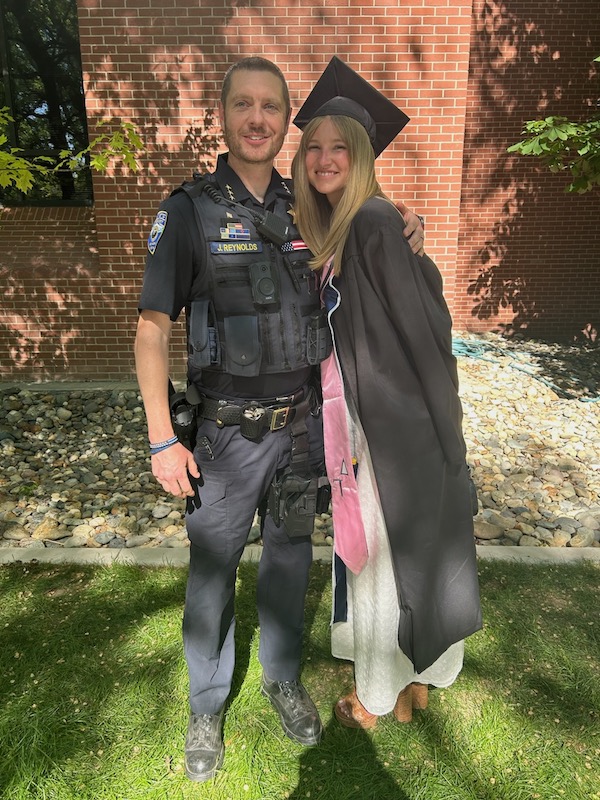 Deputy Chief Reynolds shares this same passion for his community, which is one reason he chose a law enforcement career. “I always wanted to have a positive impact on my community,” Reynolds said. “I also enjoyed the thought of being able to encounter many different individuals with varying degrees of life experience and how that would likely lead to me learning many different things.” As the Deputy Chief of UPDNC, Reynolds can watch young adults grow, improve themselves and eventually graduate, ready to begin a new chapter of their lives. Not only do students have the chance to learn from Reynolds, but he also has the opportunity to gain new perspectives and life experiences, continually bettering himself. “My chief is very inspirational and motivational and often speaks of ‘The Starfish Story.’ I wholeheartedly believe in the message within the story, ‘It made a difference to that one.’ If I can be a positive influence and make a positive impact on one person’s life situation, then it is worth it,” Reynolds said. Being in a university environment, Reynolds has had the opportunity to educate and ultimately prepare his community for worst-case scenarios. “I have had the opportunity to educate hundreds of young female students while instructing women’s self-defense classes,” Reynolds said. “I have provided active assailant presentations and met with various groups to discuss many other topics related to safety. As mentioned above with ‘The Starfish Story,’ if I can make a positive impact on just one of these persons and the result is that they are safer or more confident, then it is all worth it,” Reynolds concluded. Unlike Chief Reynolds and CSO Davila, who each knew from a young age that they wanted to pursue careers in law enforcement, Officer Piñón initially envisioned attending law school after earning his bachelor's degree.  Piñón applied to some local law enforcement agencies as a backup plan while considering law school, never truly intending to enter that career. However, after the Oct. 1, 2017 shooting in Las Vegas, he felt a profound calling to help those in need. “Though I was not there at the time it occurred, the aftermath of the Route 91 shooting made me feel helpless while, at the same time, feel a sense of duty,” Piñón said. “I felt that since I had the ability to do more, I have the obligation to do more. I took a few more years to earn my graduate degrees before I was eventually hired by UPDNC.” Piñón particularly appreciates how he can “solve the problem upstream.” With a smaller community to care for, Piñón can dedicate more time to providing resources and ensuring individuals receive the long-term care they need. “By far, this has been one of the most challenging and rewarding jobs I have done,” Piñón said. “We only get to see a keyhole-sized glimpse on the law enforcement profession in the media. At the end of the day, our job is to enforce the law and to ensure the safety of the community. However, being able to do more in pursuit of those objectives is another perk of the job.”  By: Macie King Daniel Jones TEDx Talk Associate Professor of Management in the College of Business Daniel Jones reflects on his TEDx Reno talk  Lexi Trent Paris Olympics Trent is one of 15 students from the School of Journalism who are in Paris covering the Olympics 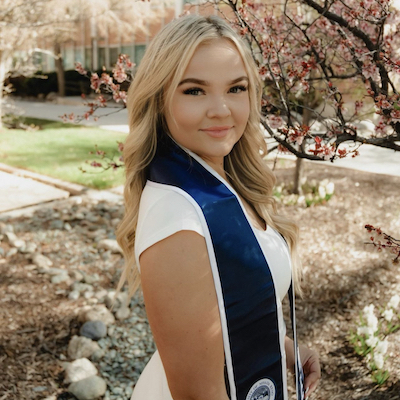 Human Robot Interaction Lab Undergraduate researcher and Nevada Undergraduate Research Award recipient Stosh Peterson helps develop a robot task controller  Wooly Wonders Undergraduate researcher and PREP awardee Andrew Hsu discusses his ‘sheepish beginnings’ with research  Editor's Picks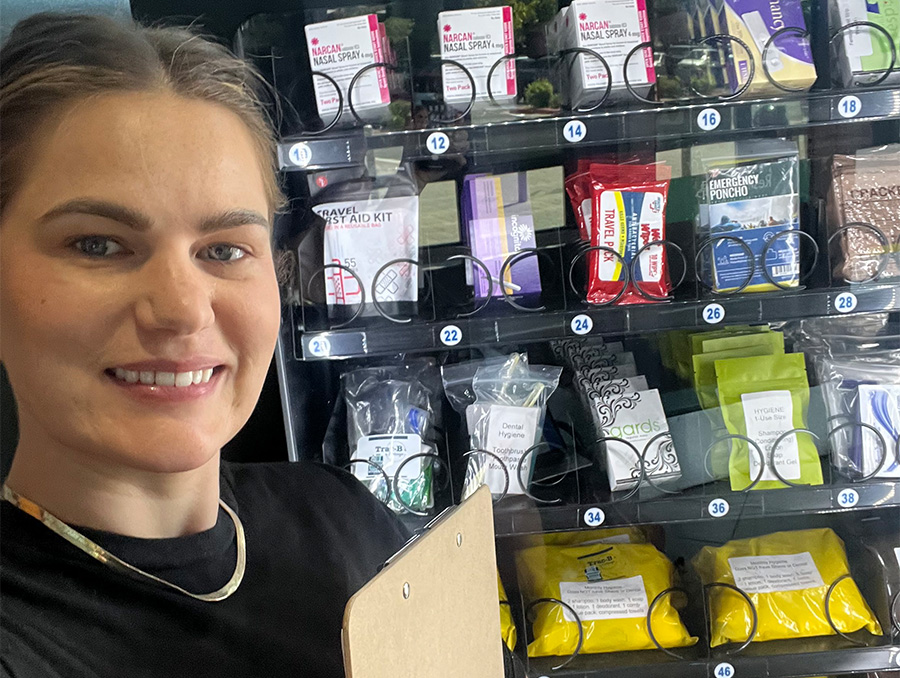 Student awarded NIH research grant for groundbreaking research on harm reduction vending machines 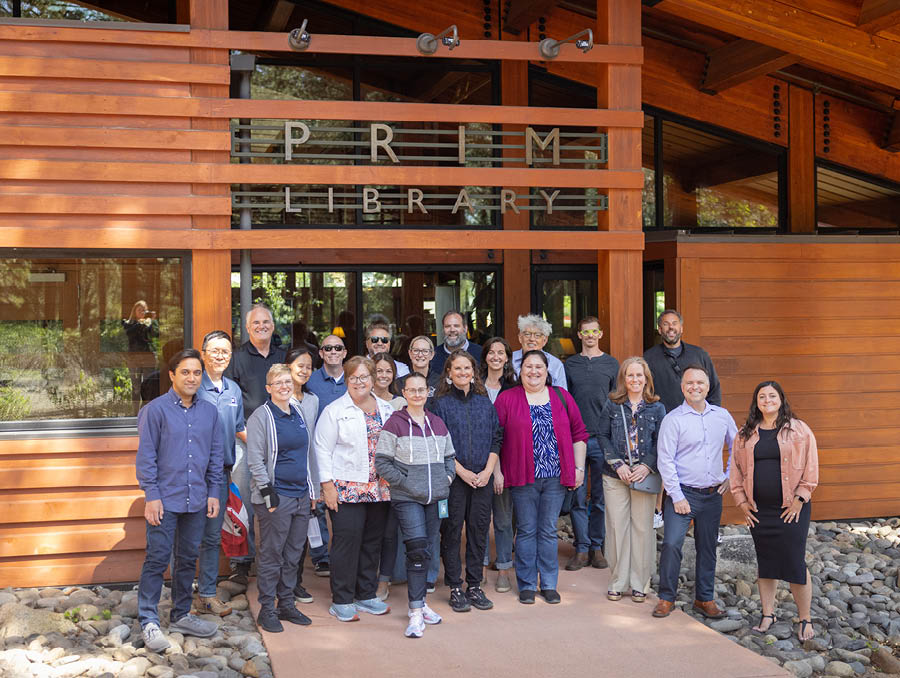 At the Digital Wolf Pack Initiative Spring Retreat, faculty learn how to utilize AI for better teaching and learning  Sagebrushers season 3 ep. 7: Foundation Professor Peter Goin 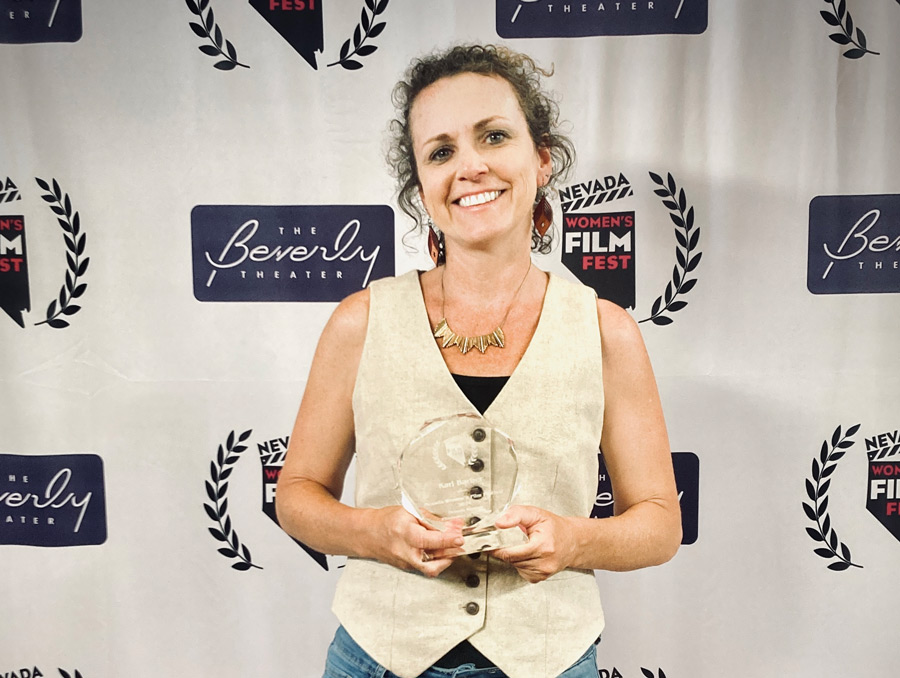 Kari Barber named Nevada Woman Filmmaker of the Year Nevada TodayMeet the man behind the decades-long University Olympics connection Local journalism students have been covering the Olympic Games since 1960 and will continue in Paris this week 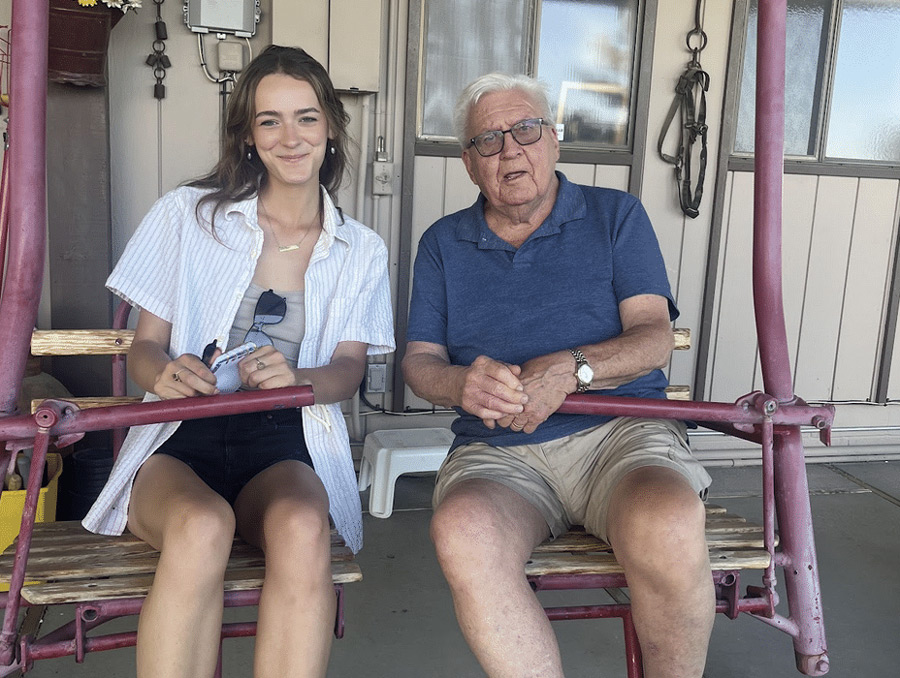 New Extension county coordinators aim to boost operational efficiency and impact Four county coordinators will serve eight rural Nevada counties  Top U.S. cybersecurity official praises University teacher-training initiative National cyber director says Research Experiences for Teachers helps professional pipelines  $1.16 Million award strengthens literacy support for Nevada educators Educators statewide attend Nevada Science of Reading Summer Literacy Institute  University researchers teaming with DOE to study environmental data in Alaska Work could improve the health of people, wildlife on Unalaska Island 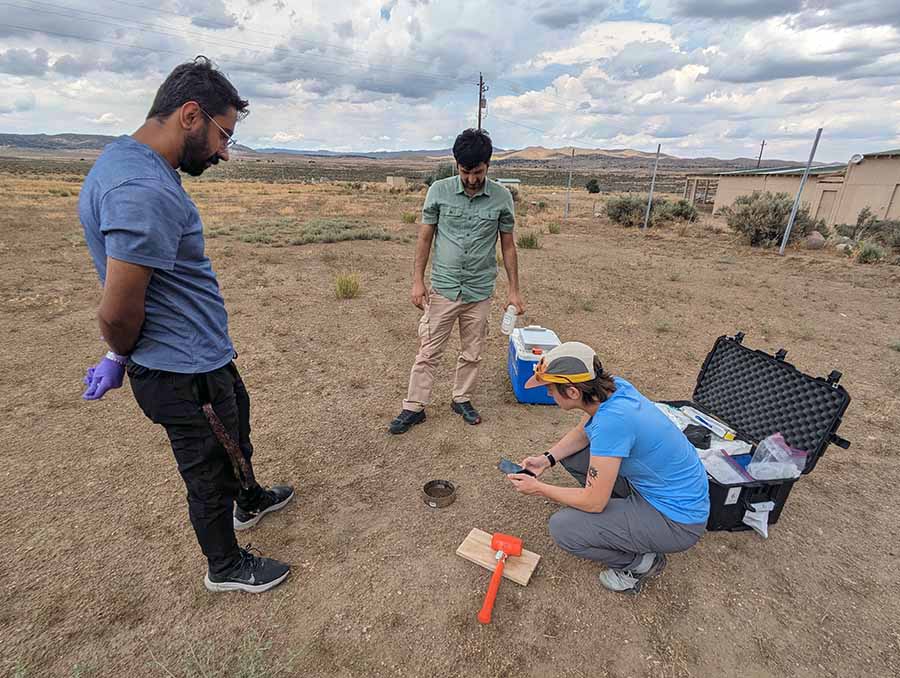 Faces of the Pack: Emmy Award winning documentary filmmaker Brent Kirkland Journalism alumnus Brent Kirkland was awarded an Emmy for his original short documentary following South Carolina football star Darius Rush 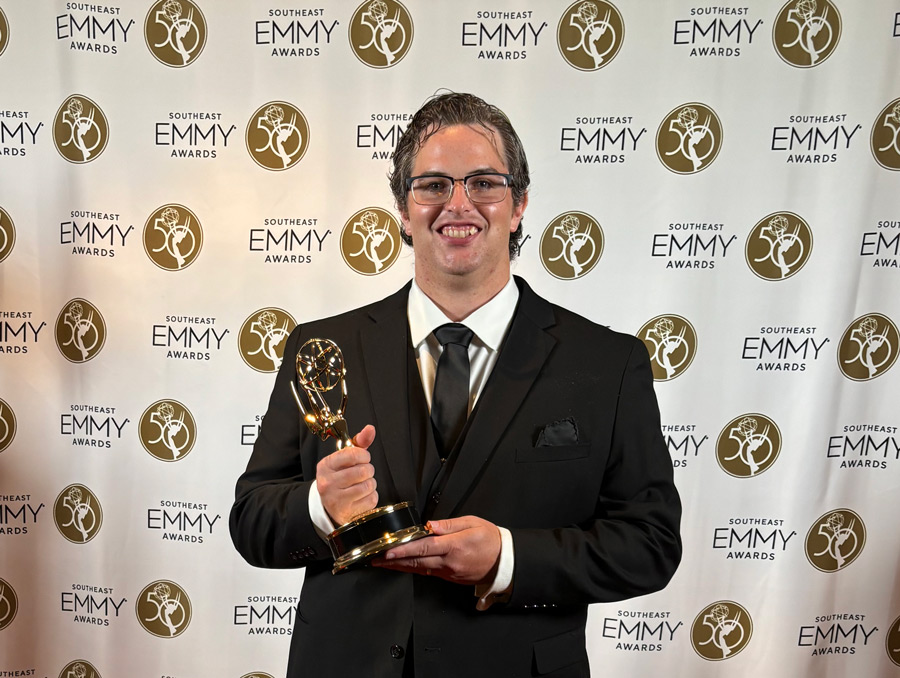 Geographer turns peatlands workshop into a “science vacation” Julie Loisel hosted the workshop at the University of Nevada, Reno at Lake Tahoe  SME Career Development Grant awarded to Metallurgical Engineering Assistant Professor Ehsan Vahidi The John N. Butler Endowed Professor in Extractive Metallurgy becomes one of three recipients nationally to receive grant in 2024   Israel NewsIsrael news features every important moment from the Jewish State involving politics, celebrities, and innovation. This is the hard hitting, fast paced news that represents the Jewish nation in an un bias frame so that truth about Israel is represented in the media. There is no other substitute for the best Israel news on the web... Israel PoliticsIsrael sports, israel culture, benjamin netanyahu, defense news, crime in israel.  Israel breaks out with a pair of judo medals at Paris Olympics Major haredi systems to face organizational overhaul after financial trouble 'Without agriculture, we face an existential threat': Food security experts speak at conference Israel warns its citizens to brace for terror attacks abroadMinister chikli criticizes idf for enabling continued reserve service of brothers in arms leader, israel's former ambassador to the us michael oren joins emergency squad in the galilee. Michael Oren served in the paratroopers' brigade during the First Lebanon War, and he will soon join Kfar Blum's emergency squad, Israeli-Druze pharmacist becomes doctor, rejoins IDF with a missionThe Druze community in Israel, unlike some other minorities, serves in the military and is known for its loyalty to the state. Drama in Israel's defense establishment and the spy satellite array amid warThe IDF's oldest spy satellite recently went out of service after 22 years and burned up in the atmosphere. Ofek-5, launched on May 28, 2002, was one of Israel's first operational imaging satellites. 'God will avenge the blood of the angels who were murdered,' released hostage Almog Meir Jan writesStruggling to find answers, Jan admitted that some things are beyond human understanding. Jerusalem mourns Shai Doron, president of the Jerusalem Foundation, who passed away at 64Shai Doron, the influential president of the Jerusalem Foundation, died suddenly in London at 64. His impactful leadership at the Foundation and the Jerusalem Biblical Zoo has left a lasting legacy. Mixed day for Israel in 2024 Paris Olympics“I am very disappointed,” Israel head coach Guy Luzon began. “I think that when the score was 0-0 we were very close to scoring a goal. Public officials, businesspeople across the aisle – leave IDF out of politicsThe call came after protests on Monday, including at least two members of Knesset and one minister, broke into the Sde Teiman base and after dozens of protestors also broke into the Beit Lid base. Combatting Hamas West Bank influence: Inside new IDF countermeasure unit‘We are working together to ensure October 7th does not repeat,’ said unit commander, Lt. Col. D., to the Jerusalem Post. 'We see the Druze as family': Jewish orgs. announce aid for Majdal ShamsThe Jewish Agency, JFED of North America, and Keren Hayesod announced 600,000 NIS in donations to the Majdal Shams council amid deadly terrorist attack by Hezbollah. IDF cannot focus on drafting only haredim who work, AG saysLimon's letter addressed the fact that the IDF chose to send out its first three thousand draft orders to haredim who were listed as either working or studying in universities. By subscribing I accept the terms of use and privacy policy 'Highest price ever for killing one person': Houthis celebrate strike as Yemenis suffer 'Dismantling Hamas from within': IDF uncovers trove of Hamas secrets Voight: My daughter Angelina Jolie was influenced by antisemitic people - regarding Gaza Iran has something to fear: Israeli strike on Yemen shows IAF can reach Tehran Operation 'Outstretched Arm' demonstrates Israel's F-35's stealth striking capabilities  | 












































































IMAGES
VIDEO
COMMENTS
Restate key supporting arguments. The final stage of creating the plan of your law essay is to pick 2 to 3 key supporting arguments which you discussed in the main body of your paper and outline them again. This time, however, you will not be getting into a detailed discussion of how case law or statute sections justify your supporting arguments.
Part 1: Introduction. The law school admissions process can feel confusing, scary, and overwhelming. Questions like "What LSAT score do I need?", "How many law schools should I apply to?," and "Do law school rankings matter?" likely weigh on your mind.. But amid all the uncertainty, there's one thing we know for sure: the two most important components of your law school ...
A good structure for a law report would be as follows: Title Page: showing the title of the report, the author, the person for whom the report is prepared, and the date of completion. Summary/Synopsis/Executive Summary: (approx 10% of word count) - this will identify: The purpose of the report, The scope of the report - issues covered/not ...
At the same time, you'll need to be able to communicate your ideas clearly and persuasively. In this article, we'll cover some top tips to guide you through the process of planning, researching, structuring and writing a first-class law essay with confidence. 1. Start In Advance. Give yourself plenty of time to plan, research and write your ...
The example law essays below were written by students to help you with your own studies. If you are looking for help with your law essay then we offer a comprehensive writing service provided by fully qualified academics in your field of study. Law Essay Writing Service.
There is a danger, though, in always caving at the first resistance to writing. Writing is hard work. It requires endurance and persistence. Force yourself to try to write for at least 10-15 minutes. A mentor was fond of saying, "Screw your a-- to the chair and don't get up.".
This resource will focus on theoretical based law essays. There are a number of strategies that may help you in starting, structuring and presenting a law essay. 1. Starting your answer. The first step to a successful law essay is understanding the question. One of the most effective ways of breaking down the question is to identify the ...
Body Paragraphs: Paragraph 1: Discuss the importance of intellectual property rights in the pharmaceutical industry. Paragraph 2: Examine the role of patents in protecting innovation in the industry. Paragraph 3: Analyze the impact of patent expiration on the industry and the introduction of generic drugs.
Present the central argument. One of the most important aspects of your law essay that needs to be included in the introduction is the central argument, that is the point you will be trying to prove in your essay. Relying on simple vocabulary and phrasing, explain the central argument that you will be attempting to prove throughout your essay.
5. Don't Neglect Time Management. Essay writing can be time-consuming, especially when juggling multiple assignments and commitments. Develop a realistic schedule and allocate sufficient time for research, writing, and revising your essay. Avoid procrastination, as it can lead to rushed and poorly executed work.
It is normal for these modules to be assessed by requiring the student to complete essay type answers throughout the course period. The vast majority of students undertaking an LLM will have a great deal of relatively recent experience in writing essays at undergraduate level. Whilst the general writing process may be similar, the depth ...
Most law students agree that the volume of writing isn't so much of an issue. Your longest pieces will be law review papers, and the footnotes alone can be extensive and time-consuming. But they warn course work grades are often based on essays or papers, and the marks you get on these will make or break your pursuit of a law degree. In the ...
Voluntary Prosecution and the Case of Animal Rescue. Vol. 137 No. 4 February 2024 On October 3, 2022, two animal rights activists — one of whom, Wayne Hsiung, is an author of this Essay — faced a felony trial and up to... Justin Marceau. Wayne Hsiung. Steffen Seitz.
An implied trust can only arise in the absence of an express trust.2 The starting position in determining the equitable ownership of any property is that equity follows the law: if one person owns 100% of the legal title, they will be presumed to own 100% of the equitable title.3 Implied trusts represent an exception.
The University of Chicago had a few essays posted on their site from admitted students that gave me a good point of reference. Although there is tremendous flexibility in writing the personal statement, it should not be so wacky as to discourage the admissions committee in your abilities as a writer or in your seriousness about attending law ...
As a law student who has successfully published an op-ed in my local newspaper, I want to share some strategies that I found successful. With the assistance of my professor (who co-authored this guide) and other professionals in my network, I published an op-ed in the Tampa Bay Times on a timely subject I am passionate about.
Over the last year, as a result of the 2023 Supreme Court decision on race-conscious admissions, most law schools have changed their prompts for the essays that have long been known as "Diversity Statements.". These new prompts have many names, but two of the most common are Life Experience Essays and Perspective Essays, so we will refer to ...
In managing the facilities of the institutions and supervising student events, administrators will need to be knowledgeable about the law of torts. The Legal System Issues in Law and Public Health Theories of democracy can describe why it is the collective duty of government to provide health amenities to the communities.
Students check 10 lines, short and long essays for Kargil Vijay Diwas. Every year on July 26 people observe Kargil Vijay Diwas. On this day, people salute the bravery and sacrifices of the armed ...
The Idaho law mentions Critical Race Theory; the directive from the Florida school board bans it in classrooms. The Texas law forbids teachers from requiring students to understand the 1619 ...
A significant advantage of working in large law firms is that it helps immensely in building your social class and network. These lawyers earn within the range of ninety five thousand to one hundred and ten thousand Canadian dollars in their first working year (SOC216, March 8, 2016). However, working in a large law firm has its disadvantages.
"President Biden's illegal student loan cancellation plan is grossly unfair for the millions of people who have worked hard and sacrificed to pay off their student loans. Additionally, hardworking North Carolinians, many of whom do not have student loans themselves, should not have to pay for someone else's degree," said Senator Tillis.
Aashiq Jivani - Stanford Law School Diversity Statement Whereas most of the students of Stanford Law School hail from families with decorated educational backgrounds, I am one of the eleven-thousand first-generation students currently enrolled at the University of Texas at San Antonio (UTSA). While obtaining a degree as a first-generation ...
Ten challenges that invite teenagers to engage, experiment, reflect and create — via writing, photography, audio, video and more.
As someone who just graduated from college, I find it fascinating to hear about what drives someone to their profession. While some degrees lead directly to specific careers, others are so versatile they can feel aimless. So, how do fresh graduates navigate finding a job that inspires them ...
The Jerusalem Post Customer Service Center can be contacted with any questions or requests: Telephone: *2421 * Extension 4 Jerusalem Post or 03-7619056 Fax: 03-5613699 E-mail: [email protected]